Back to reality
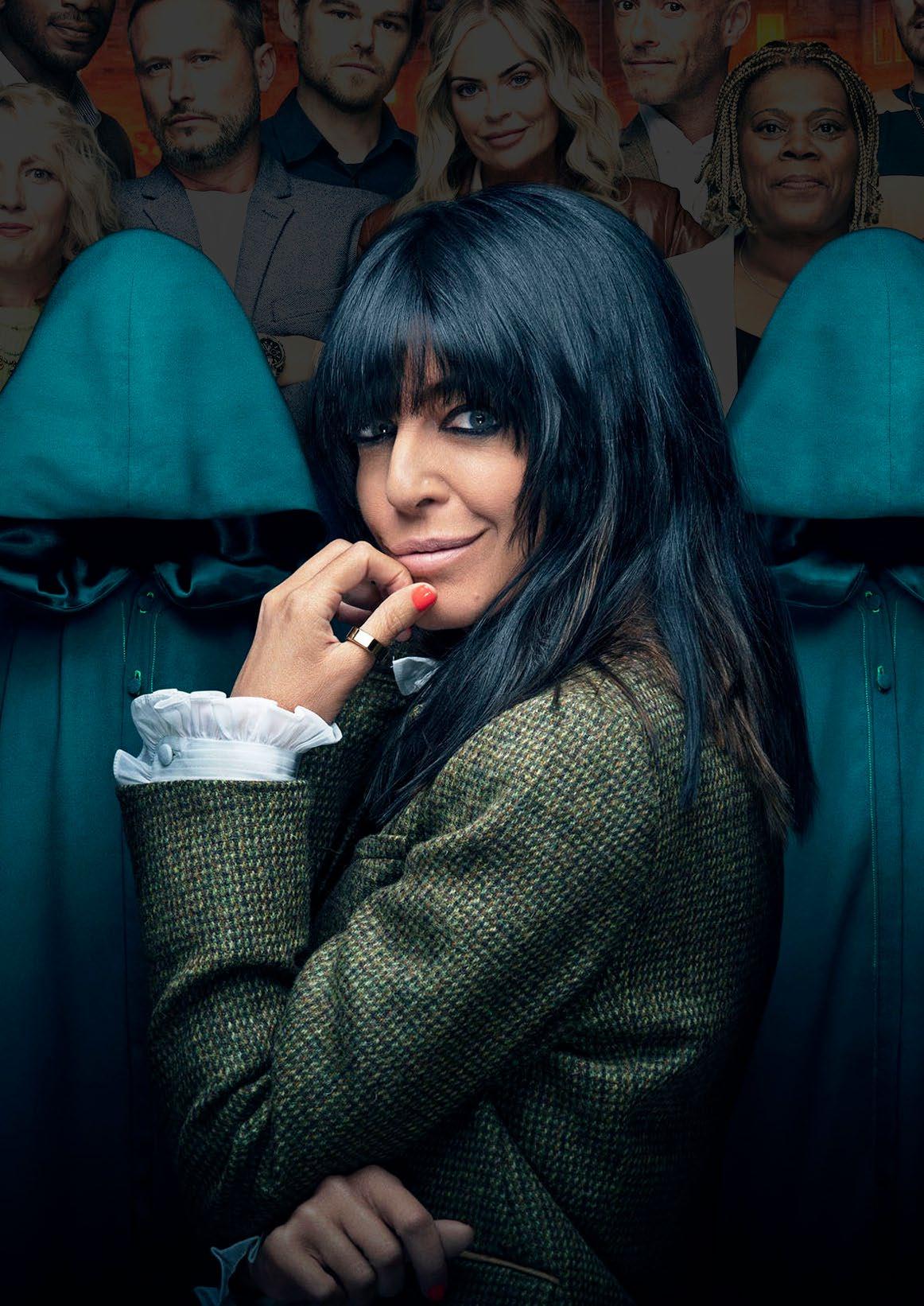
June 2023
RTS Cambridge Convention 2023
20 - 21 September
Chaired by:

Alex Mahon, CEO, Channel 4
Speakers include:
Mike Fries, CEO and Vice Chairman, Liberty Global Shay Segev, CEO, DAZN
Bryan Lourd, Co-Chairman, Creative Artists Agency (CAA)
Linda Yaccarino
Debbie Weinstein, VP & MD, Google UK & Ireland
Evan Shapiro, Media Cartographer
Ajaz Ahmed, CEO, AKQA
Jordan Schwarzenberger, Co-Founder, Arcade Media, The Sidemen
Returning speakers:
Tim Davie, Director-General, BBC
Carolyn McCall, CEO, ITV
Dana Strong, Group CEO, Sky
Maria Kyriacou, President, Broadcast & Studios, International Markets, Paramount Global
Stephen van Rooyen, CEO, Sky UK & Ireland and Chief Commercial Officer, Sky Group
ROYAL TELEVISION SOCIETY
Book now: rts.org.uk
It has been a phenomenal year so far for reality TV. Shows such as The Traitors, a winner at this year’s RTS Programme Awards, The Piano and Race
Across the World have all struck a chord with audiences. Caroline Frost analyses what makes these series tick in our cover story – and our latest “Anatomy of a hit” event on 13 June features –you guessed it – The Traitors
Could ChatGPT create the next big global reality format or even the successor to Succession? Find out in Simon Bucks’s fascinating piece on how artificial intelligence is changing
From the CEO Contents
TV, plus the opportunities – and threats – that AI presents for those who work in the content sector.
If this sounds like a theme for an episode of Black Mirror, you wouldn’t be wrong. Harry Bennett finds creator Charlie Brooker in ruminative mood as he explains what inspired him to write season 6 of the Netflix flagship.
We’ve had a non-stop schedule of RTS events, both in London and across the UK in recent weeks. I’ve never seen the Cavendish Conference Centre as full as it was for our event on Eurovision. Don’t miss Matthew Bell’s report.
At another event, Sky’s content chief, Zai Bennett, talked fluently and
candidly about his goals at the pay-TV giant – and revealed the show he regretted turning down when he ran BBC Three.
We also cover two recent events in the North West – the inaugural RTS Story Conference held in Liverpool, where screenwriters received tips on how to enhance their careers, and David Liddiment’s Anthony H Wilson Memorial Lecture in Manchester.
All this and Wayne Garvie’s TV Diary.
5 6 8 13
Wayne Garvie’s TV Diary
Wayne Garvie detects a new trend in global music – and warns that Man United’s decline provides a lesson in failing to innovate
Comfort Classic: I’m Alan Partridge
Steve Clarke celebrates the most cringeworthy, pompous prat in broadcasting’s rich history of narcissists
Ear Candy: Believe in Magic

Harry Bennett is hooked by a sensitive investigation into misdeeds under the influence of Munchausen syndrome
Working Lives: Animation supervisor
Catherine Mullan has created a cornucopia of characters and creatures over more than two decades in film and TV
Reality bites back
The Traitors and The Piano are winning big audiences. Caroline Frost wonders what makes them special –apart from sharing the same presenter
AI: friend or foe?
From fake news to copyright infringement, AI is raising alarm across TV, but there are real benefits, too, says Simon Bucks
Dystopia’s bleeding edge
Charlie Brooker is taking Black Mirror in a new direction for its sixth series, reports Harry Bennett
26
‘More British than the streamers’
Sky’s content chief, Zai Bennett, tells the RTS what it takes to make standout TV such as Gangs of London and I Hate Suzie
Top of the poppermost
The RTS learns how the BBC team behind Eurovision delivered a spectacular chart topper at Liverpool Arena
The magic of Granada
In his Anthony H Wilson Memorial Lecture, David Liddiment recalls how the ITV company fostered a unique and enabling creative culture
Our Friend in Bristol
TV folk make good neighbours, it seems, so canny local authorities support our industry, says Lynn Barlow

Pay attention, wordsmiths
The inaugural RTS Story Conference, hosted by the North West Centre, provided valuable tips for new and seasoned screenwriters
Sky comes out fighting
Shilpa Ganatra gives a blow-by-blow account of two new documentaries that aim to give a fresh perspective on the pugilistic art
RTS news and events
Reports of the Society’s seminars, events and awards ceremonies from around the UK and Ireland

3 Television www.rts.org.uk June 2023
Production, design, advertising Gordon Jamieson gordon.jamieson.01@gmail.com © Royal Television Society 2023 The views expressed in Television are not necessarily those of the RTS. Registered Charity 313 728 RTS, 3 Dorset Rise London EC4Y 8EN T: 020 7822 2810 W: www.rts.org.uk Journal of The Royal Television Society June 2023 | Volume 60/6
Editor Steve Clarke smclarke_333@hotmail.com
18
24
7
Cover: The Traitors (BBC)
Theresa Wise
27 30 10 Sub-editor Linda Coffey thelindacoffey@gmail.com News editor and writer Matthew Bell bell127@btinternet.com 16 22 32
licensed worldwide, we’ve got the perfect soundtrack, whatever your project.
audionetwork.com/discover

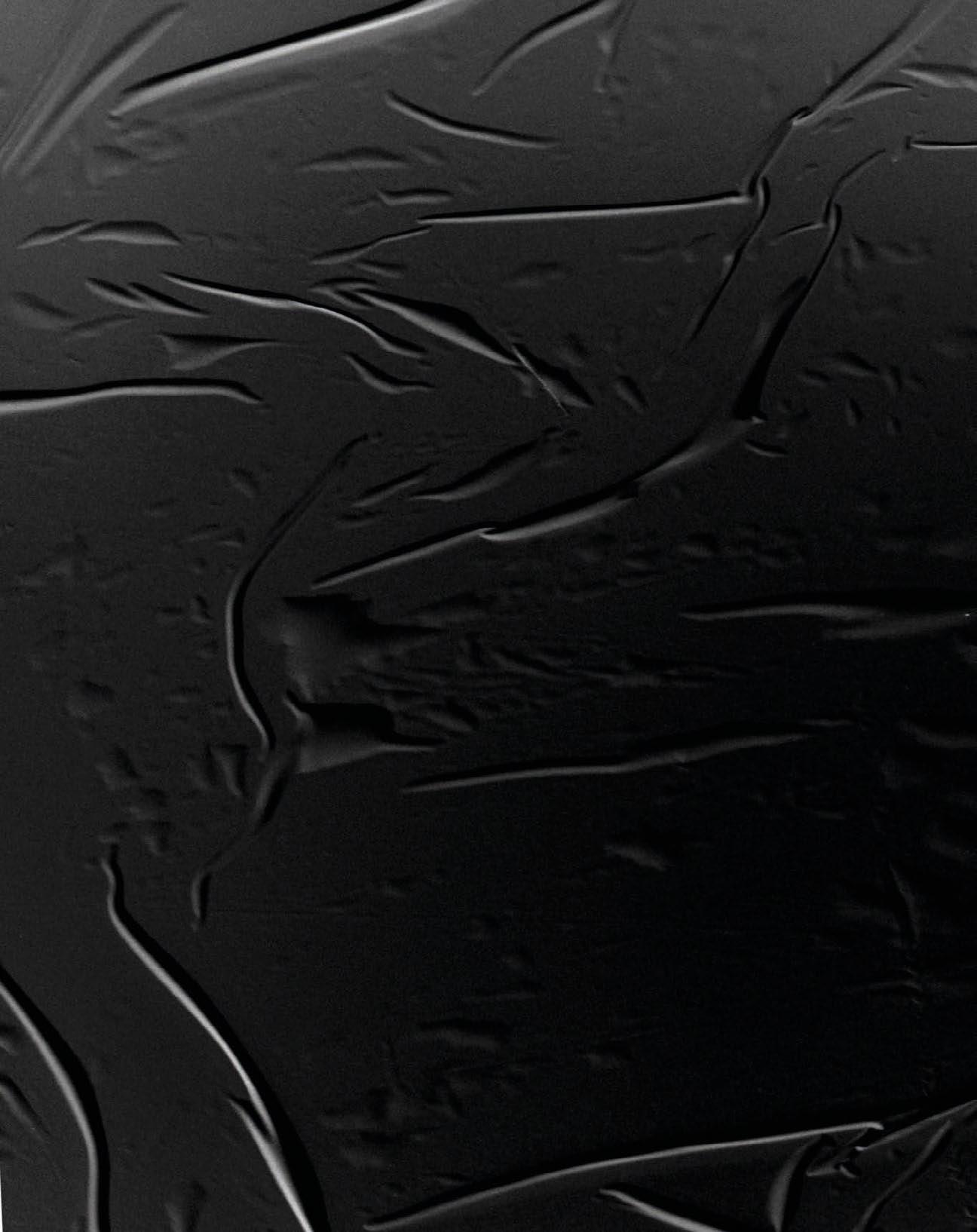
SEND US YOUR BRIEF - MUSICSEARCH@AUDIONETWORK.COM
MUSIC DISCOVERY MADE SIMPLE
ALYUSHA CHAGRIN (VOCALISTUK)
TV diary
I’m at Sony’s Culver City studios for a summit meeting between our film and television senior team and Sony’s music heads, led by the irrepressible Rob Stringer. We are looking at ways of working together to bring more music projects to the screen.
It’s a good group and a good day – a very good day. The most eyecatching presentation comes from Afo Verde, who heads Sony’s Latin American music. Modern Latin pop and rap has gone quickly from regional to mainstream, and Afo’s team is at the heart of it.
Artists such as Bad Bunny and Rosalía are at the crest of a tsunami of change. It feels as if this is a vast shift in global music that few would have predicted.
We agree to fast track some of the development work our Latin teams are on to make the most of this wave.
■ Talking of unexpected developments, who could have foreseen Manchester City’s ascent 15 years ago? Well, my Catalan pal Ferran Soriano, CEO of City Football Group, the club’s owners, who has presided over this transformation.
Ferran oversees 13 football clubs around the world. He is in Brazil to meet another of the group’s clubs, EC Bahia, and, en route, is visiting our production label Floresta in São Paulo to discuss a potential project.
We have discovered our jobs have much in common: talent development and management, global vs local, constant innovation, but, as a Man United season ticket holder, I find it intensely annoying how bloody good he is at his job.
Garvie detects
Sunil Patel becomes an unexpected star of the night with his bright-pink dinner jacket and onstage exuberance. There is comedy confusion with the (excellent) hosts, Romesh Ranganathan and Rob Beckett, as Patel leaves the stage, which may or may not have contained the words “outside” and “see you” and, if so, in jest.
One thing that is easy to predict is the Whisper team’s continued innovation and success in the coverage of sport.
music
■ Leaving the studio for my flight home, I pass the line of writers who are picketing daily outside all the US studios.
Back in the UK, the strike is making British writers and their agents nervous, especially when dealing with subsidiaries of US studios. Pact and the Writers’ Guild of Great Britain issue a clarification that appears to reassure people. That said, there appears no immediate end to this strike, which is also about responses to changes that were unforeseen not so long ago, from the rise of streaming to artificial intelligence.
■ To the Baftas, where our label Whisper wins for its amazing coverage of the Women’s Euro 2022. CEO
■ Ferran calls and asks if I’d like to come to Istanbul for the Champions League Final. For once, I am lost for words, before mumbling something about seeing how the FA Cup Final goes first…
■ To Wales for a day with the Bad Wolf team, taking Alex Webster and Jonny Slow of Pixomondo, the VFX/ virtual production company that Sony acquired last year.
Pixomondo has done some amazing work on a Bad Wolf show so top secret I can’t mention its name. We discuss how its virtual wizardry can be used not just on fantasy/sci-fi projects but also for Dope Girls, Bad Wolf’s forthcoming period drama for the BBC. Such a joy to work with people who continually innovate –both the Bad Wolfers and Pixomondo.
■ To Wembley and the FA Cup Final with my daughter Lara. We’ve had better days out. United’s decline is a warning to us all about failure to change and innovate when you’re at the top of your game.
Wayne Garvie is President, International Production, Sony Pictures Television.
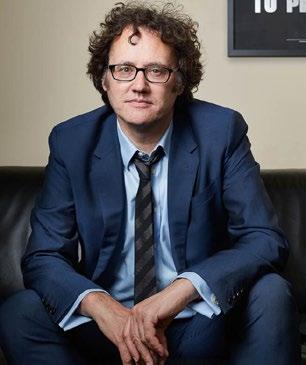
5 Television www.rts.org.uk June 2023
Wayne
a new trend in global
– and warns that Man United’s decline provides a lesson in failing to innovate
Richard Lewisohn/Sony
COMFORT CLASSIC
I’m Alan Partridge
Little did we think, when Alan Partridge first appeared as a sports reporter on BBC Radio 4’s incisive news spoof On the Hour in 1991 – his voice inspired by the late, great John Motson – that he would become a comedy icon, a national treasure even.
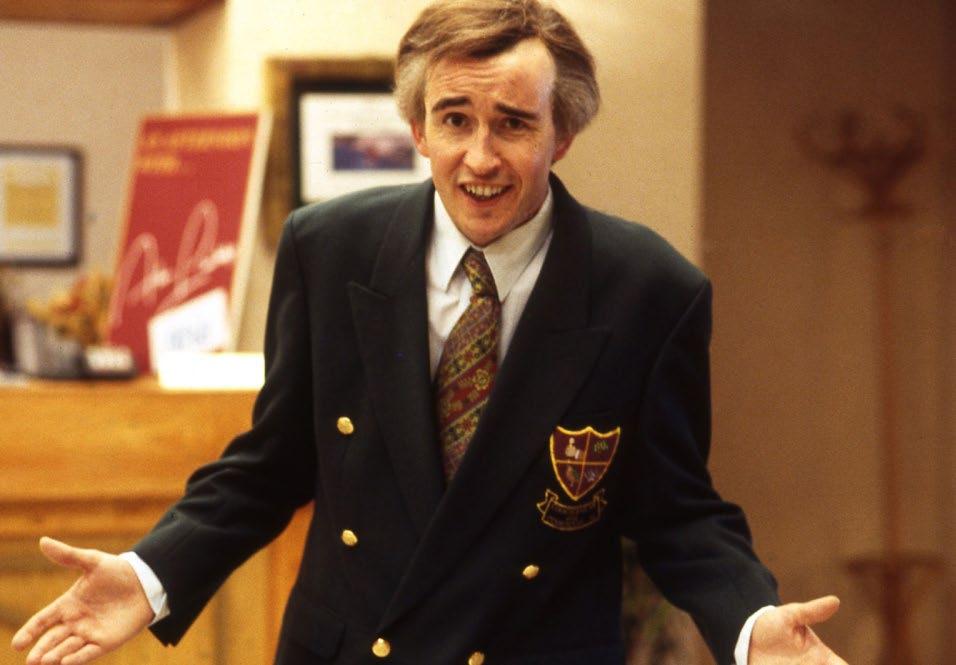
It seems appropriate that someone as terminally uncool as Alan, a man who, after all, is in no doubt that Wings were a better band than the Beatles, should have emerged during John Major’s premiership. Steve Coogan inhabits the character to a degree that is so brilliant as to be almost uncanny.
According to Armando Iannucci, who co-created Alan with Coogan and Peter Baynham, the character arrived “fully formed”. All the grotesqueness, gaucheness and lack of self-awareness was present from the start. “The moment he started speaking, we laughed because
Steve Clarke celebrates
we all thought: ‘We kind of know this guy, we know his aspirations,’” Iannucci told Radio Times two years ago.
“We knew he felt paranoid that the journalists on the radio show looked down on him as not a serious journalist because he did sport. And, really, he had ambitions to go to television and all that. And we just couldn’t help talking about him when we weren’t making the show.”
Even so, Iannucci and his co-creators could not have imagined that Alan Partridge would still be making us laugh – and cringe – three decades
later, most recently in the painfully sharp This Time, as our hero once again lays waste to a TV studio.
Coogan first played Partridge in a fully fledged TV series in 1994’s hilarious chat show parody Knowing Me, Knowing You; he had made his smallscreen debut as Partridge earlier that year when On The Hour transferred to TV as The Day Today
By the time I’m Alan Partridge arrived in 1997, Alan’s career had taken a sharp downturn. He had been sacked by the BBC, and his personal life was on the skids after his wife, Carol, had kicked him out.
These trying circumstances were catnip for maximising the character’s comic potential and I’m Alan Partridge is widely regarded as Coogan’s comic masterpiece. The Radio Times Guide to TV Comedy noted: “The previous radio and TV series featuring Partridge only skimmed the surface of the character;
6
BBC
the most cringeworthy, self-centred, pompous prat in broadcasting’s rich history of narcissists
here viewers saw him in all his loathsome glory. The result was a dazzling comedy tour de force.”
Alan is living, if that is the word, fulltime in a bland motel, the Linton Travel Tavern, and working the graveyard shift as a presenter for Radio Norwich. Inevitably, he is desperate to return to the big time and has chosen his place of residence because it is equidistant between Norwich and London.
In episode 1, there is an excruciating lunchtime encounter between Partridge and a BBC TV bigwig. Alan is beyond keen for the executive to rehire him, or are least commission one of his ideas. Monkey tennis, anyone? It is not to be, and the gaffe-splattered lunch ends when Partridge attacks the po-faced BBC boss by threatening him with a large piece of cheese.
Despite his endless insensitivity to virtually everyone he has a conversation with, audiences can’t help feeling at least a smidgen of sympathy for Alan. Baynham, Coogan and Iannucci’s writing is pitch-perfect, as are the performances.
The exchanges between Partridge and his PA, Lynn (Felicity Montagu), are – that word again – grotesque. Lynn, a dowdy, 50-year-old spinster who attends a Baptist church, panders to her boss’s every whim, attempting to win sponsorship deals with local firms for Alan and ensuring he has his medications for his flaking skin and fungal-infected feet.
A nice running gag is the Geordie odd-job man, Michael (Simon Greenall) employed by the motel. His accent is effectively a foreign language to Alan and leads to much incomprehension on the part of our hero.
Series 1 of I’m Alan Partridge was a multi-award winner. Season 2 – by which time Alan was living in a static caravan while his dream home was being built and had acquired a Ukrainian girlfriend – had its merits. But its creators have acknowledged that the series was much harder to write, partly because, by then, Ricky Gervais had shifted the grammar of TV comedy with The Office
They shouldn’t have worried. Eight years after I’m Alan Partridge ended, he was back in Mid Morning Matters, refreshed by a new writing team. Alan Partridge is nothing if not irrepressible. ■
I’m Alan Partridge is available on Amazon Prime, ITVX and Now TV.
Ear candy
‘II’ve never had so many people say they’ve bingelistened to something I’ve made before.” So tweeted journalist Jamie Bartlett last month. Having proved his eye for a serial podcastworthy story with the 2019 hit The Missing Cryptoqueen, Bartlett is back with another gripping tale of internet deception for BBC Sounds.
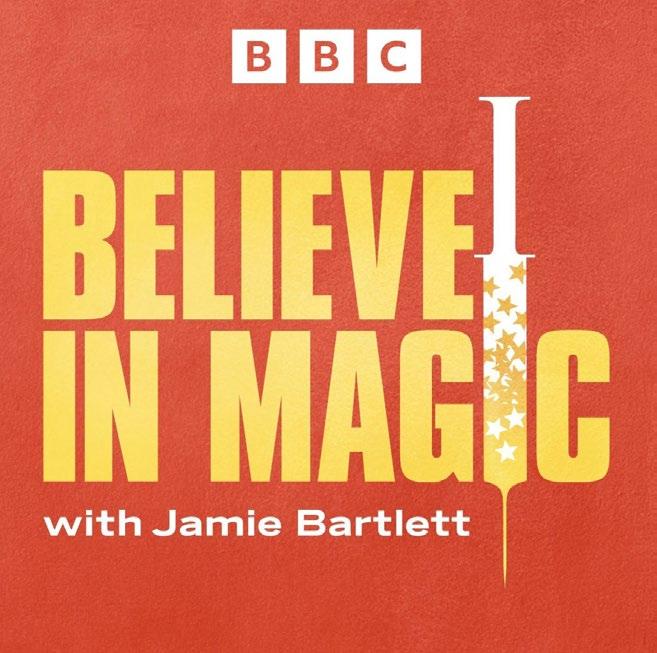
The name reads like a taunt now but, until it was closed for mismanagement in 2020, Believe in Magic was a charity granting wishes to seriously ill children. Among those whose imagination it captured was One Direction, one of the most successful boy bands ever.
And who can blame them? It was launched by the ostensibly inspirational Megan Bhari, a 16-year-old girl who was herself extremely unwell.
Or was she? The first of seven parts, which introduces us to Bhari via excerpts from old interviews in which she comes across as warm, sincere,
and quietly excited, ends with her turning cold and calculated as she quietly threatens an internet sleuth who is beginning to ask some uncomfortable questions.
It is here, teetering on the first of the huge cliffhangers that bookend each episode, that I became hooked.
Megan’s is a tangled and thorny story, complicated by a combination of illnesses – real, fake and induced –and a mountain of medical evidence. But Bartlett lays it all out clearly, objectively and compellingly.
Even those familiar with the mysterious Munchausen syndrome will be fascinated by this unique case. At one point, Bartlett consults Dr Marc Feldman, an expert on the syndrome, who reckons Megan is one of those growing number of people who fake conditions to meet celebrities.
I would wager that it is a natural consequence of a culture that worships celebrity above all else. ■
Harry Bennett
7 Television www.rts.org.uk June 2023
BBC
WORKING LIVES Animation supervisor
Catherine Mullan has created a cornucopia of characters and creatures over more than two decades in film and TV. She has worked on everything from Dinotopia to Disney’s live-action Dumbo to a slow-motion Jack Russell in the new Flash movie. She is head of animation at the visual effects studio One of Us.
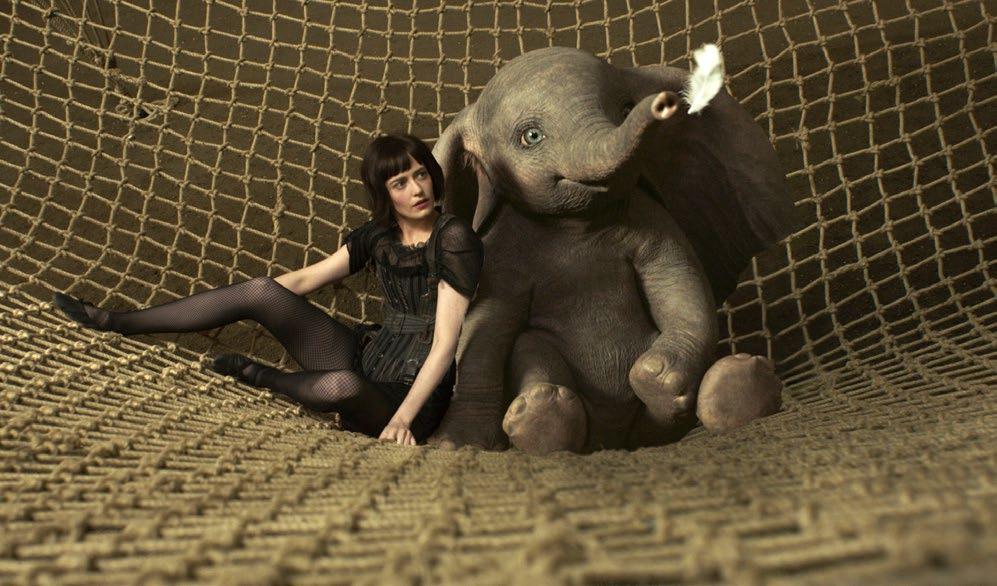
What does the job involve?
It involves supervising the animation across a visual effects project, which can be anything from a simple car or plane to something more complex, such as a hero character or a creature. A supervisor works closely with the animation team, production, the visual effects (VFX) supervisor and the director.
It sounds as if your involvement in a project can vary hugely?
Yes, some projects need animation that’s not integral to the story, such as moving cars in the background. This type of work needs to be realistic; the viewer shouldn’t know it’s animated, but it’s not time consuming and I may be involved for only a week or two.
However, with a principal creature or character, the animators are delivering the performances and it’s much more complex work. On Dumbo, I was the animation supervisor, and I was working on it for two and a half years.
At what point are you brought on board a production?
On animation-heavy projects, I could start work in pre-production and be involved in character development. It’s exciting for the film-maker to see their characters come to life at an early stage. Also, understanding the behaviour of a creature and how it moves can inform its design and also how it is shot.
Why did you choose computer animation?
At school, I was very much into art and maths, but I didn’t want to focus solely on one or the other – I didn’t want to go to art college or go down a technical route.
I stumbled across the computer animation course at Bournemouth University: there was a book in our school careers library that cross-referenced
different subjects – and it was listed under art and maths.
In the late-1990s, computer animation was still a niche area and in its early stages as an industry. I knew nothing about the subject, but it sounded so interesting that I took a gamble.
How did you break into animation?
After leaving Bournemouth, I was lucky enough to be hired as a junior animator by Framestore, a very successful visual effects house. My first project was working on the TV mini-series Dinotopia. It was an amazing project to kickstart my career and there was a great team of animators to learn from.
How has your career developed?
I was at Framestore for about five years before moving to MPC, where I became a lead animator and then an animation supervisor.
A decade or so later, I moved to One of Us to help build its animation team. I’ve been here for three years now, and we’re working on some really great projects, including Damsel, a fantasy film for Netflix, which stars Millie Bobby Brown.
8
Disney
Dumbo
What do you bring to work with you?
Since joining One of Us, I’ve mainly been working remotely, from home. I just need a computer, a monitor, a Wacom tablet and a VPN connection to the studio.
Will animators return to the studio?
In general, people are reluctant to go back to the office full-time, and have proved that they can do the work remotely. I moved from London to Belfast two years ago and I live here permanently now. I go to the office for a few days every couple of months to reconnect with the team. Our animation supervisor on Damsel is in Bulgaria; we have animators all over the UK and France.
Do you have to be better at drawing or technology?
The work is sometimes technical and everyone needs to be able to use the software, but animators don’t draw – for work, at least – it’s all done within the computer. You could liken the process to stop-motion animation, where you have a puppet that you move around. The difference is that our puppet lives within the computer. Computer animation also allows for a lot more flexibility than stop motion.
What makes a good animator…?
Observation skills are key. We use a lot of reference, depending on what we’re animating. It’s often animals or humans and we study their motion. It can be difficult to get this motion right, but the characters must be believable.
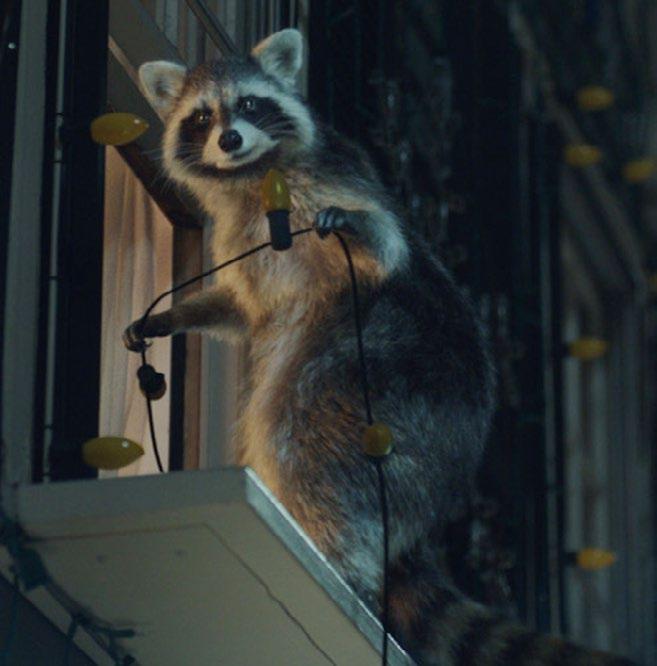
… And a good animation supervisor?
Communication is at the heart of the job – with the animation team and production and with the client VFX supervisor and director. You need to have a strong vision and effectively steer the animation.
You also need to adapt quickly, as there are often changes in direction. Animators can be sensitive and they put so much of themselves into their work, so you need to be respectful when giving feedback. I’ve heard animators called “shy actors”, creating performances through their characters.
Which work are you most proud of?
Maleficent starring Angelina Jolie was the first project I supervised. We created an array of fairy creatures and a dragon; it was a really fun challenge and a great success. And Dumbo, of
course – I’ll always have a soft spot for that little elephant.
Most recently, I’m very proud of the team I am building at One of Us; they are a super-talented bunch who are creating some world-class animation.
There are so many resources online, including free software and tutorials. Nowadays, there are also many shorter courses specifically for animation, rather than doing a visual-effects degree that will take three years.
What are the best and worst parts of the job?
There is huge job satisfaction in bringing a character to life and seeing it on television or the big screen. The worst parts are the tight deadlines and the sometimes long hours.
Are there any tricks of the trade you can share with us?
Animators often film themselves to work out the performance of a character. I have seen animators acting as dragons and fairies.
It’s fun to watch but is also really useful to pinpoint a performance. It’s much quicker to act something out yourself than to animate it to see if it works.
What advice would you give to someone wanting to work in animation? There are many different routes. Formal education is one, but I know very successful animators who are self-taught.
And once you have trained… ?
It’s all about your showreel. Post a short video of your work on Vimeo and send out links. When you’re starting out, you don’t have a high volume of work, so there is a tendency to show everything you have done, not just your best work, but shorter and sweeter is always best.
Has the job changed over time?
The software and tools have improved, but the craft is very much the same, although the projects tend to be bigger and the deadlines shorter.
What are your animation ambitions?
It’s all about landing the perfect project. There are so many interesting shows being made. Many animators are into big creatures and superheroes. For me, it’s all about a good story and an interesting character. ■
9 Television www.rts.org.uk June 2023
Catherine Mullan was interviewed by Matthew Bell.
Disney+
Godmothered
Reality bites back
While everyone continues to remark on the so-called golden age of drama on TV, a growing number of constructed factual shows have been quietly grabbing huge audiences and winning awards.
Fresh off the block, The Traitors –effectively a game of “wink murder” writ large in a spooky Scottish castle, with Claudia Winkleman presiding – won at the RTS Programme Awards and the British Press Guild Awards, as well as grabbing two Baftas.
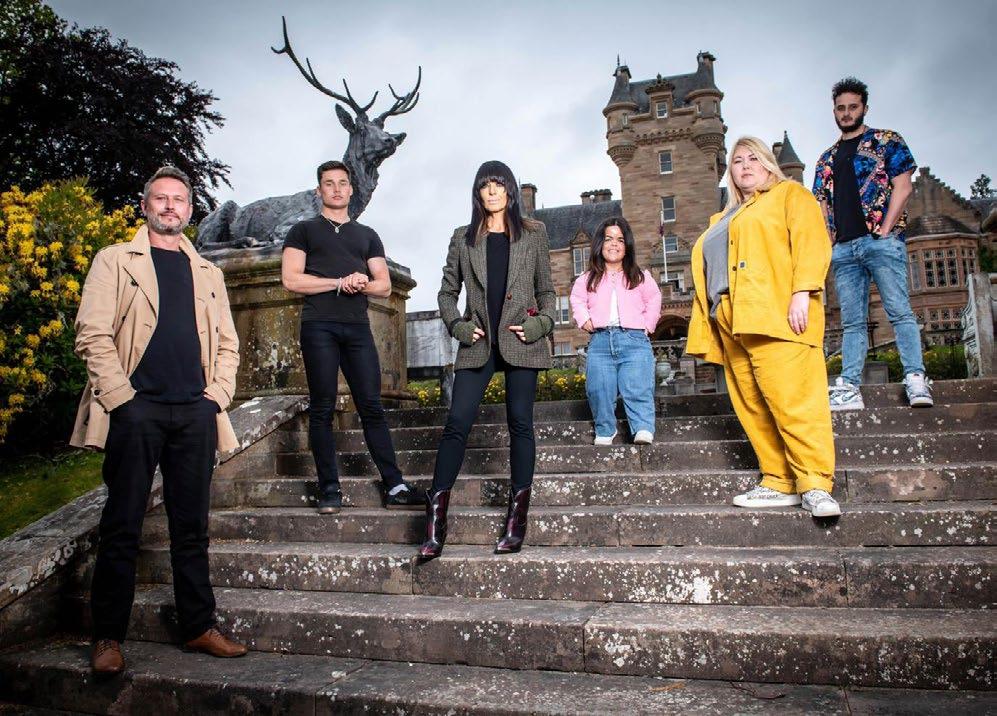
It is made by Studio Lambert, which also drew huge audiences for season 3 of the BBC’s Race Across the World. In the latest series of the latter, competing
couples try to be first to cross from one side of Canada to the other without an aeroplane, for a cash prize.
Meanwhile, Love Productions, maker of The Great British Bake Off, has another hit on its hands with The Piano, a heart-warming showcase of diverse musical talent filmed in train stations around the country. Once again, Winkleman is in the cab, with professional “observers” Lang Lang and Mika on hand to arbitrate.
How can we explain this trend? One reason is economics. Michael Jochnowitz, BBC Commissioning Editor for Popular Factual and Factual Entertainment, says: “Drama has become a lot more expensive to make – three or four times the price of a factual show. As broadcasters, if you see
certain shows delivering similar or stronger audiences, that’s part of the current appeal.”
The US writers’ strike will inevitably encourage broadcasters and streamers across the Atlantic to commission more reality fare. But there is no doubt that the ideas must be strong and distinctive. Race Across the World started out with the title “Walk the Line”. The idea was that people had to get to their destination in as straight a line as possible (inspired by Burt Lancaster’s character in the film The Swimmer).
Executive producer Tim Harcourt reveals that it went through several iterations before it found its legs. “We kept saying it’s not a race until, eventually, we said: ‘Why not make it a race?’ The BBC got behind it and, for
10
BBC
The Traitors and The Piano are winning big audiences. Caroline Frost wonders what makes them special – apart from sharing the same presenter
The Traitors, with Claudia Winkleman
a while, it was called ‘Flightless’ – with a strong, environmental message.
“We almost made it with celebrities, but backed away from that. We decided to film in a documentary style because we knew it had to feel real, and make viewers ask: ‘What would I do if I were in that situation?’” Episode 1 of series 3 drew an audience of 6.3 million people.
The Traitors was adapted from Dutch format De Verraders, which had done very well in the Netherlands with celebrities taking part. “We stuck to our guns with this one,” says Harcourt. “It was a real game playing out in the real world, and the stakes would be higher with ordinary people involved.
“We wanted relatability and the stakes to be high. Plus, once we found our amazing castle, we leaned into the Scottishness, and that led to some of the games and the feel of it – something for Claudia to have fun with.”
If there is a special sauce, perhaps it is Winkleman, whom Harcourt credits for a fair proportion of The Traitors’ big audience: 3.2 million tuned in for the series finale. “She brought warmth and humour. It could have seemed overly pompous and macabre, or silly and trite, but she managed to walk that line between the two.”
Richard McKerrow, executive producer on The Piano, agrees that Winkleman is a singular talent. “She cares about people and can bring them out. It’s important to have an MC who gives an accessible frame to viewers, who might not be interested in the technical side of things. She lights up the screen.”
The Piano came out of a chat between McKerrow and Channel 4 content boss Ian Katz, both of whom, it transpired, were learning to play the instrument. “We started filming people who played the public pianos in documentary style. A lightbulb moment was: ‘Maybe we can hide the judges?’ There is a grammar of television you have to respect and obey, but this felt new and different.
“Then, as we were making it, we tried to make the language more original, less competitive reality and more of a celebration.”
The huge audience numbers – more than 1 million streams on Channel 4 (formerly known as All 4) - accompany a refreshing critical appreciation for what McKerrow doesn’t like to call reality TV. “It’s always been used in such a derogatory sense,” he says. Perhaps it should be called constructed factual. “It
has been a golden age for scripted TV,” he reflects, “and harder for unscripted ideas to break through. It becomes increasingly hard to create breakthrough shows but, hopefully, we’ll do it.
“Young people are the true test, as they have so many things to watch, and there are so many competing mediums. The onus is on us producers to make the shows better and better, but why shouldn’t we?”
Harcourt agrees. “They’ve found a new punch. Streamers have invested a lot in British-made reality TV and helped the industry grow. ‘Reality’ used to be a bit of a dirty word 20 years ago,
it’s an emotional journey for our contestants, or it’s a travel show, enjoyable for some purely for the scenery.”
Harcourt is more specific as to why he believes The Traitors found its huge and passionate audience: “For me, it’s the round table where everyone is accusing each other – coming out with accusations and conspiracy theories. I love that. Whether it’s grounded in some observational truth or just a hunch, it feels so personal. Any goodwill blows apart. I could watch that all day.”
There does seem to be something in the appeal of ordinary people doing extraordinary things, whether that’s
but I think people now see it for the fun it is.
“They’re terrifically overwrought gameshows, played out as human theatre. But it’s not enough for the show to be good, you need all the elements to line up for a hit. For something to really pop, it’s still terrifically hard.”
Jochnowitz adds: “Audiences are more sophisticated. We [producers] need to be smarter. Sometimes, if viewers know it’s an out-and-out gameshow, they’re far more accepting of rules of engagement. With Race Across the World, there’s a realness and authenticity – you can’t overproduce it, you have to respect the audience.”
Apart from ensuring Winkleman’s involvement wherever possible, there seems to be not so much a special sauce to achieve a hit as a magical combination of elements.
Jochnowitz describes the different layers on which Race Across the World works: “It’s an adrenalised gameshow,
betraying a close friend in a castle or playing the piano at St Pancras station.
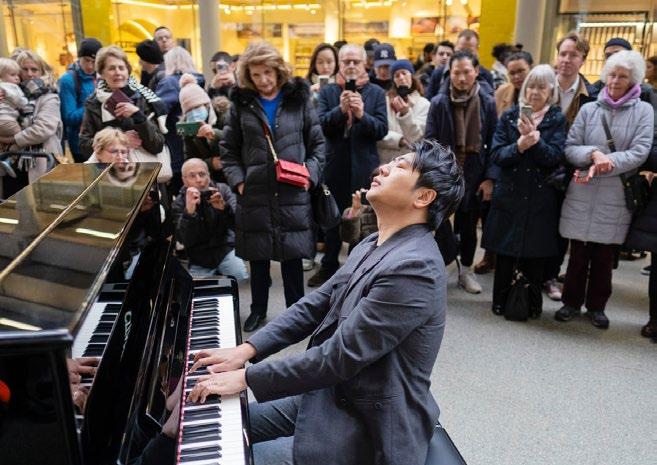
McKerrow takes pride in The Piano’s range of characters, plus the wide genre of music being showcased, and delights in the unpredictability of the train station setting.
“You were creating a studio in an uncontrolled environment, so you had unscripted documentary reality going on, which gave it a magical quality. Plus Mika and Lang Lang hadn’t met before, and their relationship developed on camera. The interplay between the elements made it special.”
Despite his impressive record, however, McKerrow is as hesitant as Harcourt and Jochnowitz to come up with any kind of formula for this kind of success. “There is a terrible tendency to think we know what audiences want. All I can do is come up with distinctive ideas and make them to the best of my ability. There is no special sauce.” ■
11 Television www.rts.org.uk June 2023
Channel 4
The Piano, with Lang Lang at the keyboard

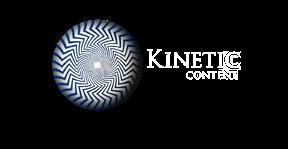

24 #RTSawards HOSTED BY VICK HOPE STREAMED LIVE FROM 2PM ON 25 JUNE 2021 AWARDS STUDENT TELEVISION RTS Sponsored by THE RTS CONGRATULATES ALL THE NOMINEES AT www.rts.org.uk 2023 BOOK YOUR PLACE AT RTS.ORG.UK HOST: WILL NJOBVU BFI SOUTHBANK LONDON SE1 8XT 23 JUNE
AI used in the fight against malaria: Synthesia tools permitted David Beckham to apparently speak nine languages while Charlatan aged him by decades for the advert Malaria Must Die So Millions Can Live
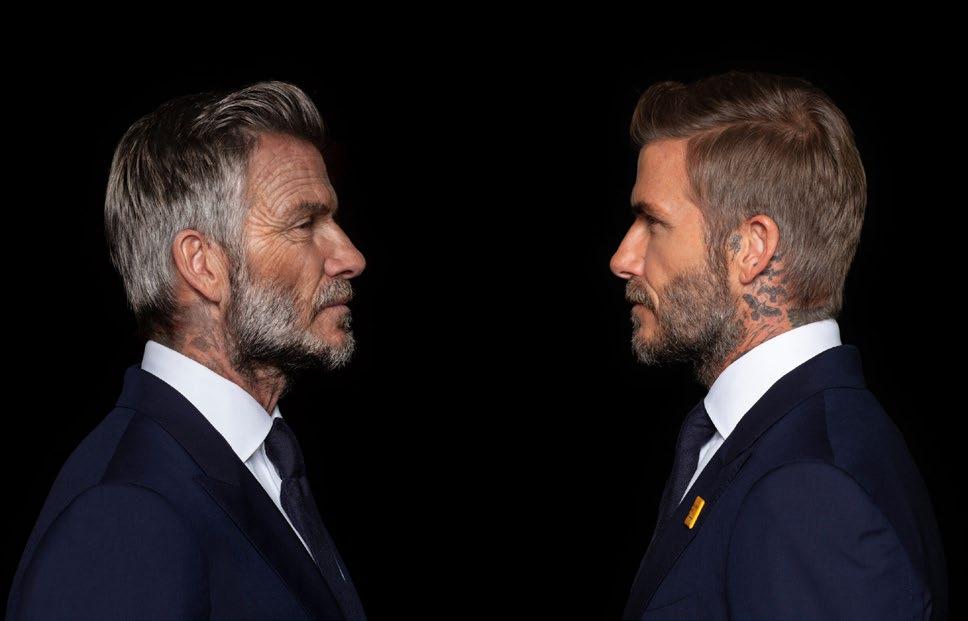
AI: friend or foe?
Should the television industry be worried about artificial intelligence (AI) or excited? Or both?
Each day seems to bring fresh warnings that AI will wreck businesses, cast thousands out of work and even destroy the human race. So, is TV safe? Judge for yourself from this little experiment.
“Can you suggest a format for a new television gameshow?” I asked the AI chatbot ChatGPT.
“Here’s an idea. Title: Brain Busters,” it offered, instantly. “Format: two teams of three contestants each compete against each other in a series of rounds that test their knowledge, memory and problemsolving abilities.”
“Rubbish!” cried Peter Bazalgette, the former ITV Chair, who knows a thing or two about formats, having brought Big Brother to the UK.
OK, not gameshows. How about drama? “Sure, here’s an idea for a 13-part series. The Legacy follows the lives of three siblings who are forced to confront their family’s
dark secrets and long-buried traumas after their wealthy, influential father dies suddenly.”
There is derivative and then there is downright plagiarism. “It underlines my basic belief that artificial intelligence is more artificial than it is intelligent,” is Bazalgette’s pithy verdict.
So far, so entertaining. It’s easy to mock ChatGPT’s lamentable pitches, and, on this evidence, the striking Hollywood screenwriters are worrying unduly that bots may take their jobs. Nevertheless, AI undoubtedly brings real opportunities, as well as threats, to the TV and film industries.
ITVX’s recent show Deep Fake Neighbour Wars is a parody that uses AI technology to create realistic avatars
of celebrities, including Idris Elba, Olivia Colman and even, weirdly, Greta Thunberg. “This is all fake. The stories are all made up,” advises the opening caption.
It is fun, but it is nowhere near the limit of ITV’s enthusiasm for AI. ITV Studios has recently set up a “global innovation hub”, embracing all its scripted and unscripted labels, with AI as a key focus. “It’s a big hot topic for us right now,” says Helen Killeen, Director of Non-Scripted Production in the UK, who leads the group with Ben Russell, Director of Production at ITV Studios International.
“One of our priorities is freeing up the time of our creatives so that they are not doing things that can be automated, but instead using their brains to develop ideas or produce the best content.”
ITV Studios has already used AI virtual locations for Emmerdale and Coronation Street, while the innovation hub is encouraging producers to look for further opportunities. The next step will be to use virtual sets for unscripted, including gameshows. “It’s a tougher challenge because of the ▶
13 Television www.rts.org.uk June 2023
From fake news to copyright infringement, AI is raising alarm across TV, but there are real benefits, too, says Simon Bucks
Digital Domain
▶ problems of cutting between multiple cameras,” says Killeen, “We think we might have found a solution, so we won’t talk about it in case it doesn’t work.”
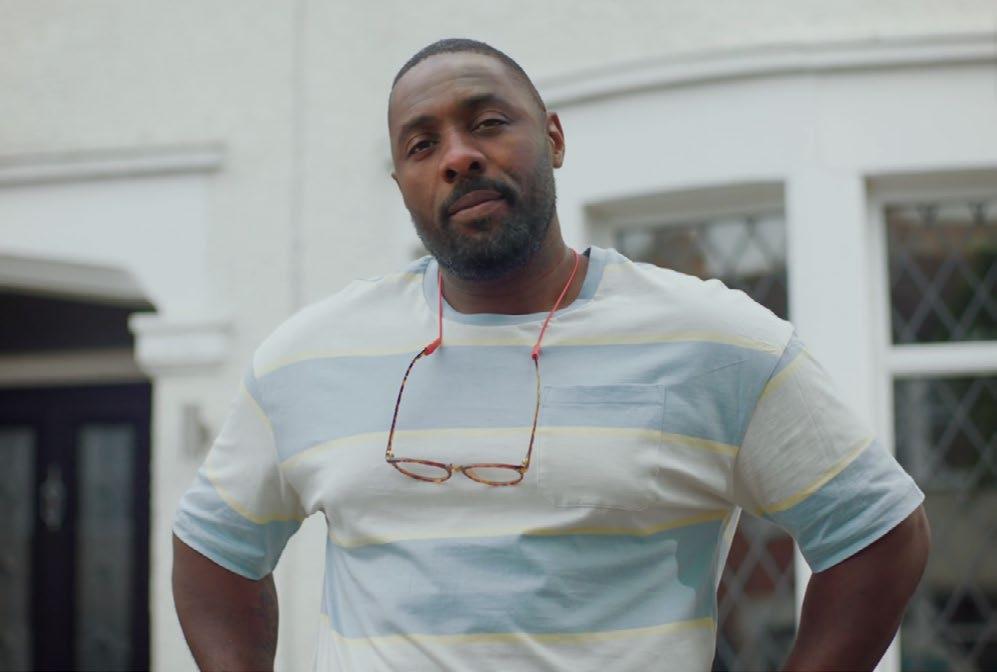
Russell stresses that one of the drivers for using AI is sustainability, providing solutions that reduce ITV Studios’ carbon footprint. For example, using AI tools means you don’t have to send loggers on location for weeks at a time.
AI based on pattern recognition supports activities ranging from development and production to distribution and scheduling.
“The big streamers have been at the forefront,” says Dawn Airey, who casts an experienced eye over this developing landscape. “Look at what Netflix did with House of Cards: it was very analytical of viewing behaviour – [it concluded] that a remake of House of Cards would hit and find an audience. And sure enough, bang, it worked perfectly.”
In fact, machine learning has long been working its production magic on video games, with films and TV piggybacking off technologies such as the 3D computer graphics game engine Unreal Engine. What is new and, for some, concerning, is that “generative”
AI has developed into a “deep learning” platform that will pass the Turing test by making a plausible stab at behaving like a human.
“I think we’re at a tipping point, because things such as ChatGPT have made the language of this stuff conversational,” says Simon Fell, Chair of the Digital Television Group and a former
“What is happening right now is nothing short of frightening. We have to act.” Speaking at a BBC event, Turness continued: “We are seeing the acceleration of AI having an impact on disinformation. It is amplifying everything that counterweights our good, true and valued journalism.”
Turness’s worries are echoed by a procession of tech gurus. Geoffrey Hinton, the Google software pioneer credited as the “Godfather” of AI, spoke for many in fearing that it will lead to the internet being flooded with false content and the average person will “not be able to know what is true any more”. Recently, Hinton left Google so he could speak more freely about his growing fears regarding the risks that AI poses to humanity.
Director of Technology and Innovation at the European Broadcasting Union. “You can ask it a question, then you can enhance that question and ask it a bit more. And it doesn’t forget what you’ve asked it previously, which is what search engines have always done.”
The ability of AI to generate convincing fakes has already led the CEO of BBC News, Deborah Turness, to warn:
A deepfake video conspiracy was the central theme of the successful BBC thriller series The Capture, but Turness’s warning is not a response to sci-fi drama. Although humanoid avatars have been around for some time, rapid advances in AI technology have made their development much easier and cheaper.
Synthesia, which made headlines by reproducing David Beckham speaking in nine languages, says its mission is
14
‘WHAT IS HAPPENING RIGHT NOW IS NOTHING SHORT OF FRIGHTENING’
ITVX comedy series Deep Fake Neighbour Wars used AI technology to turn impressionists into celebrities, such as a fake Idris Elba, embroiled in petty disputes with their A-list neighbours ITVX
“to empower everyone to make video content – without cameras, microphones or studios”. Also on parade at this year’s NAB, the US media convention, was Hour One, which – for $25 a month – allows you to create apparently authentic presenter-led videos by using “virtual humans”, following written instructions.
In a sinister development, two apparently genuine news-style videos
pyramid in one simple move and replace it with an obelisk, in real time. It saves on reshoots and it removes the tedious and unfun, repetitive parts of the process, allowing much more time for creativity.”
Fell says: “There’s a whole world there just waiting to be exploited. “The picture quality of some of the image-rendering programmes is not always perfect but it will improve.

published a white paper that promises a light-touch approach. Instead of giving responsibility for AI governance to a new single regulator, it will tell existing ones to devise tailored, context-specific approaches that suit the way AI is being used in their sectors.
For the television industry this will be in the hands of the Digital Regulation Co-operation Forum, a voluntary coalition comprising Ofcom and other
were recently posted on YouTube. The videos supporting the Venezuelan government led by President Nicolás Maduro were eventually identified as fakes and removed. The Financial Times reported that the newsreaders were avatars, and their American accents were synthesised using AI technology.
Fell, recently returned from NAB, says: “Every booth seemed to have an AI story.” Among them was Cuebric, a new product for TV and film, named after director Stanley Kubrick. It boasts the ability to render 2.5D backdrops (so-called because they convey a sense of depth without permitting 3D editing), far superior to conventional green screen, in almost real time. The producers simply type in a “prompt” –a description of the scene they want – and the machine does the rest.
It is the brainchild of Cuebric’s founders, Pinar Seyhan Demirdag and Gary Lee Koepke. Demirdag claims: “It saves money and time. It removes the heavy lifting of drawing, composing three-dimensional objects everywhere, whereas with generative AI it’s text to image. For example, a director is filming a scene with pyramids and realises the pyramid is not looking good.
“With our tool you can erase the
Ultimately, you may not have to go on location to shoot anything.”
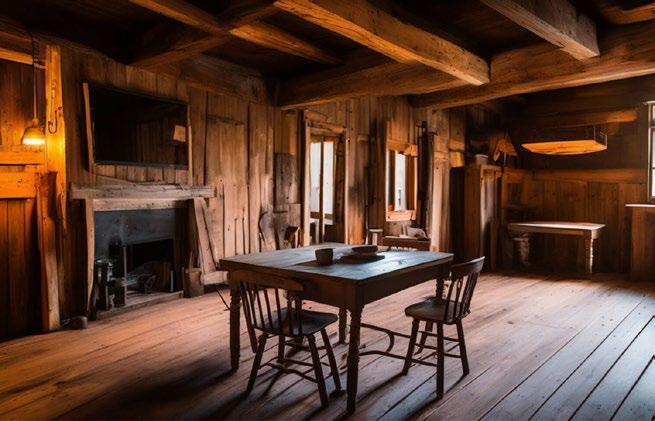
Producers insist AI won’t cost jobs, rather that it will free people from drudgery to do more creative work. However, Bazalgette, who has been voicing concerns about the risks of digital insurgency for many years, foresees other threats.
“Machine learning is potentially going to drive a coach and horses through copyright,” he says. He cites a recent case in the music industry in which a track emerged featuring fake AI-generated vocals that copied the sound of Drake and the Weeknd. After a copyright action, it was taken down by platforms such as Spotify, but he fears the same thing will happen in TV.
“This is a clear and present danger to the creative industries and to the screen industries, where intellectual property – ownership of it, its resilience and the ability to protect it and earn money from it – is their lifeblood.”
For Airey, transparency is key: “Tell me what it is that I’m consuming. Tell me where this has come from. And if you can’t, then one should be highly sceptical. The regulator will need to be all over it.”
The UK Government has just
key regulators. It is early days but a spokesperson says it is confident that “by working together, we can maximise the benefits of AI and algorithms for UK citizens, industry and wider society”.
Will light touch be enough? The Prime Minister Rishi Sunak now appears to be contemplating a tougher approach, which will be welcome news for Bazalgette. He wants watermarking on TV shows and international agreements to enforce it. Computers have their place, he says, to make content look beautiful or brilliant. “But in terms of the actual narrative, and the basic idea, it’s got to come from a person to resonate with me. And I want to know the difference. I want to know where it came from.”
So will software eat the world, as the futurologist Marc Andreessen asserted? At ITV Studios, Killeen concedes: “AI is not something we can control, all we can do is look at where it’s appropriate to use it, make sure we’re using the best partners and monitor what the output is.
“But it’s bigger than all of us. Wasn’t it Stephen Hawking who said it will be the end of humanity? It’s terrifying as well as innovative.” ■

15 Television www.rts.org.uk June 2023
AI-generated backdrops made by Cuebric: fast but loose with geometry
Cuebric
Dystopia’s bleeding edge
At one point in his book Inside Black Mirror, when discussing the inspiration for his global dystopian sci-fi phenomenon, Charlie Brooker credits the “shiny adverts for Apple” that were appearing at the time. He says: “Being a paranoid person, as soon as I see any advert where everyone’s really happy and smiley, I immediately think it’s a bit like a sinister advert in a dystopian movie.… The fact that it looked so happy meant that it couldn’t last.”
How right he was. Twelve years on, and amid all the talk of enslavement to our smartphones, addiction to social media, paranoia about data mining and hyper-surveillance, and now warnings that artificial intelligence could wipe out our species, it seems technophobia has reached fever pitch.
So what to do when the culture has caught up with you? When your series has become part of the mainstream to the extent that its very title is shorthand for any art exploring the dangers of tech (“it’s a bit Black Mirror-y”)?
When, five seasons in, you find yourself penned in by, as Brooker puts it, “what the world thinks a Black Mirror episode is”?
“When I was first doing the show,” he recalls, “it wasn’t like I sat down and thought: ‘What gizmo has just been launched this week that I have to do a story about?’ And yet I get people saying to me, ‘You’ve got to do an episode about NFTs [non-fungible tokens]’. When I hear that, I wish I was dead. Like, is that what my life is about?”
He therefore likens his approach for the sixth series, which lands on Netflix on 15 June, to “sitting in an aeroplane seat and trying to commandeer new bits of the elbow room”.
The result is a classy series of radical
departures. For starters, only one episode, Joan Is Awful, is set in the future – because, having spent most of Black Mirror’s run conjuring present and futuristic nightmares, where better to find that elbow room than in the past? Mazey Day jumps back to the early 2000s to revisit the horrors of peak paparazzi; Beyond the Sea goes even further back, to reimagine space exploration in 1969. There are gizmos, then, but old and new and somewhere in between.
Brooker says his initial plan was to make all five episodes period pieces, until the idea for Joan is Awful “popped up” and proved “irresistible”. In a daredevil opening statement that takes shots at both the Netflix overlords and their subscribers, Joan Is Awful follows the fallout from a prestige TV adaptation of the life of a very ordinary woman (played by Annie Murphy), in which Murphy’s character is played by Salma Hayek. It might be Black Mirror’s funniest episode yet; an early sign that this series plays fast and loose with tone as well as time.
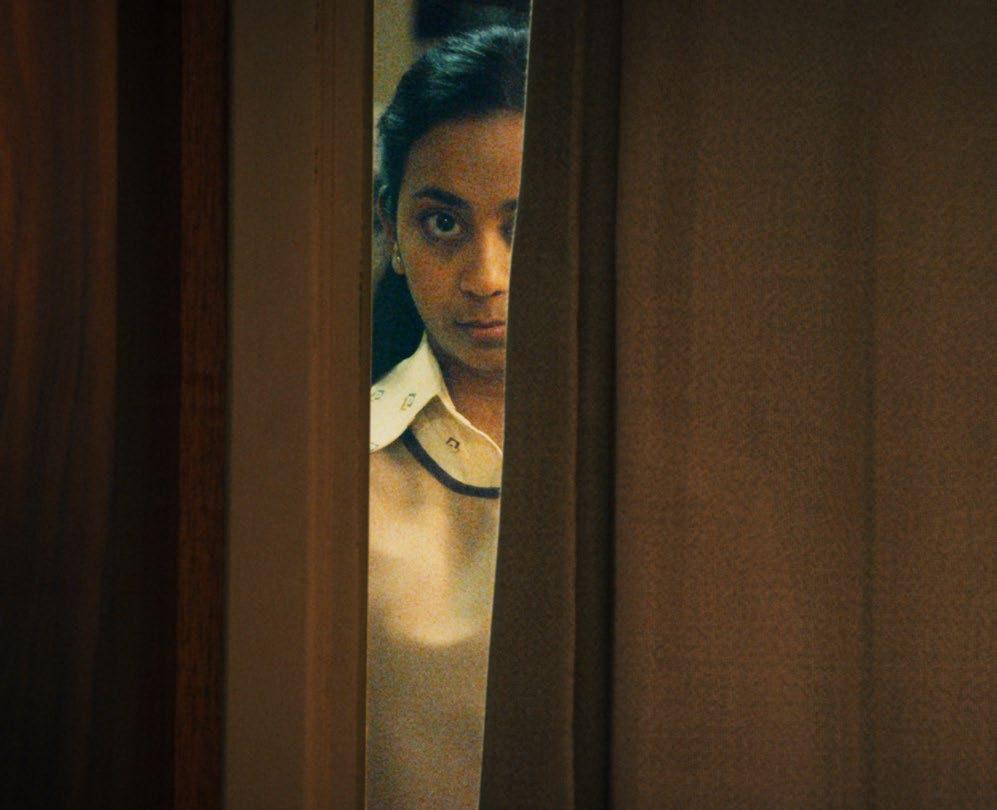
16
Charlie Brooker is taking Black Mirror in a new direction for its sixth series, reports Harry Bennett
Netflix
Anjana Vasan in Black Mirror episode Demon 79
Given that its themes include data mining, image rights and others that we are not yet at liberty to discuss, it is also perhaps the most timely of the series, justifying Brooker’s abandonment of the time limit. He admits, however, that such fickleness is the privilege of anthology: “You end up, in a Darwinian way, following what the best story is.”
Here, Jessica Rhoades, executive producer and self-described “partnerin-crime”, chimes in to spotlight the flexibility of the team, which allowed them “to just change tack
TV and you were being played by a Hollywood actress.”
Or Loch Henry, which sees a young couple (played by Samuel Blenkin and Myha’la Herrold) visit a remote Scottish town to film an ethical nature documentary, only to abandon their plans for a much juicier story of a local murderer. It is a pitch-black satire of true crime, its tendency to heartlessly aestheticise the most heinous acts and exploit our morbid curiosity.
Brooker admits he “hoovers up” true crime to the point where he is “almost
life led to me trying to work out if I can go on holiday there.” He adds that he often experiences a similar discomfiting dissonance at TV awards ceremonies, when winners are gleefully accepting awards for programmes they have made about disasters. “I’ve seen it happen at the RTS Awards!”
Such stories hint at one of Black Mirror’s underacknowledged virtues: empathy. Granted, Brooker clearly loves nothing more than existentially torturing his characters. Any number of episodes come to mind, including some of the new series, but, to avoid spoilers, special mention goes to White Christmas, the 2014 anti-Christmas special that somehow imagines two fates far worse than death, and whose end credits’ needle drop of Wizzard’s I Wish it Could Be Christmas Everyday is now bound to send anyone who has seen it spiralling.
But, beyond the sadism, and despite the aforementioned departures, this series is also a return to form in that, for all its cultural and technological insight, most if not all the episodes home in on a smaller, human story.
when a better idea came along”.
All this talk of ideas “popping up” and “coming along” makes Brooker’s creative process sound slightly passive. Perhaps because, to some extent, it is. Several of his ideas seem to stem from simply watching TV, albeit with the sensitive antennae he must have developed writing his parody listings website, TVGoHome, and The Guardian’s Screen Burn column.
Take the catalyst for Joan is Awful, The Dropout, Netflix’s docudrama about the rise and fall of Elizabeth Holmes, the disgraced founder of the biotech company Theranos: “I just thought, God, wouldn’t it be so weird if you were Elizabeth Holmes, who wasn’t on trial at the time, and you switched on the
disappointed that we have run out of murderers to document”.
This time, he was watching a “BBC true crime thing about something awful that had happened in Scotland,” and, as with all true crime docs, he notes, it started with a lovely drone establishing shot. “But this particular one was really leaning into how beautiful the landscape was. Because they love to do that, right? Look at the beauty – and then they’ll cut to someone lying dead on the floor.”
He was watching it with his wife and, despite all the horror, they ended up Googling the location because they wanted to go on holiday there. “And I thought that chain of events was weird: a terrible thing happening in someone’s
At another point in Inside Black Mirror, Brooker even jokingly rues the extent of his own empathy, specifically when portraying politically conservative characters. The last of the new episodes, Demon 79, therefore whiffed of Brooker (along with his co-writer Bisha K Ali) finally throwing caution to the wind and letting rip at the Tories. Not only is it set in Northern England during the 1979 General Election that saw Margaret Thatcher sweep to power – and stars Anjana Vasan as Nida, an Indian sales assistant experiencing the kind of racism that was being exploited by some of the candidates – it also features a particularly nasty, Enoch Powell-like politician.
Even though Nida finds herself fantasising about wreaking revenge, Brooker assures me that he wasn’t that calculated. Although he believes 1979 was a significant turning point, “because you had this populist tsunami come in and change the tone of everything, and the world became more hawkish”, he says he “wasn’t actively trying to upset the applecart. [The Tories] are doing that to themselves!”
Series 6 has broadened its horizons to send up all of true crime, the paparazzi and even Netflix itself, but it seems that some things are so self-satirising they are beyond even the Black Mirror treatment. ■
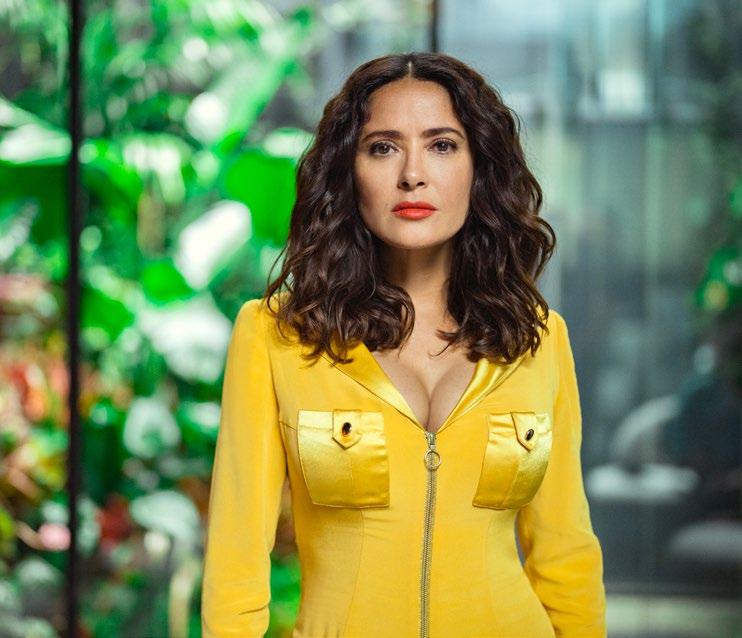
17 Television www.rts.org.uk June 2023
Netflix
Salma Hayek in Black Mirror episode Joan Is Awful
British than the streamers’
For one of the most powerful programme chiefs in the UK, Zai Bennett, Managing Director of Content for Sky UK and Ireland since June 2019, wears his authority lightly. He is responsible for a portfolio of services that includes Sky Atlantic, Sky Comedy, Sky Documentaries and Sky Arts. He has helped to nurture such hits as I Hate Suzie, Gangs of London, Bulletproof, A Discovery of Witches, Save Me, In the Long Run, Breeders and Brassic
Asked at a wide-ranging RTS “In conversation with…” event to share the most important thing he would like to impart to a member of his team when they leave Sky, his deadpan reply was: “Don’t be a twat.” He added: “You want to work with nice, interesting people who are fun.”
This description seems to apply to
Bennett himself, a TV-sector prodigy whose upward trajectory at Sky was evident under Rupert Murdoch and has continued under Comcast’s ownership. More than a decade ago, he was an influential Controller of BBC Three, commissioning hits such as The Call Centre and Bad Education. He had previously worked at ITV, running its digital channels and where he had been responsible for Celebrity Juice and The Only Way Is Essex
But today’s content landscape is unrecognisable compared with the one in which Bennett’s job was to please young adult audiences. So, too, is the economic landscape. Even the largest of media companies are feeling the financial squeeze. However, he brushed aside a recent report in The Sunday Times that Sky was preparing to axe hundreds of jobs among its customer services and engineering staff. “These are tough economic times, but ever since I’ve been at Sky, it has been ruthlessly efficient. We are constantly looking at ways of doing things better.”
Throughout, Bennett looked relaxed, even when his interviewer, the broadcaster Nikki Bedi, tried – more than once and in vain – to trip him up. He stuck to his message: he was determined to ensure that Sky remained a “best-in-class” producer and provider of premium content across
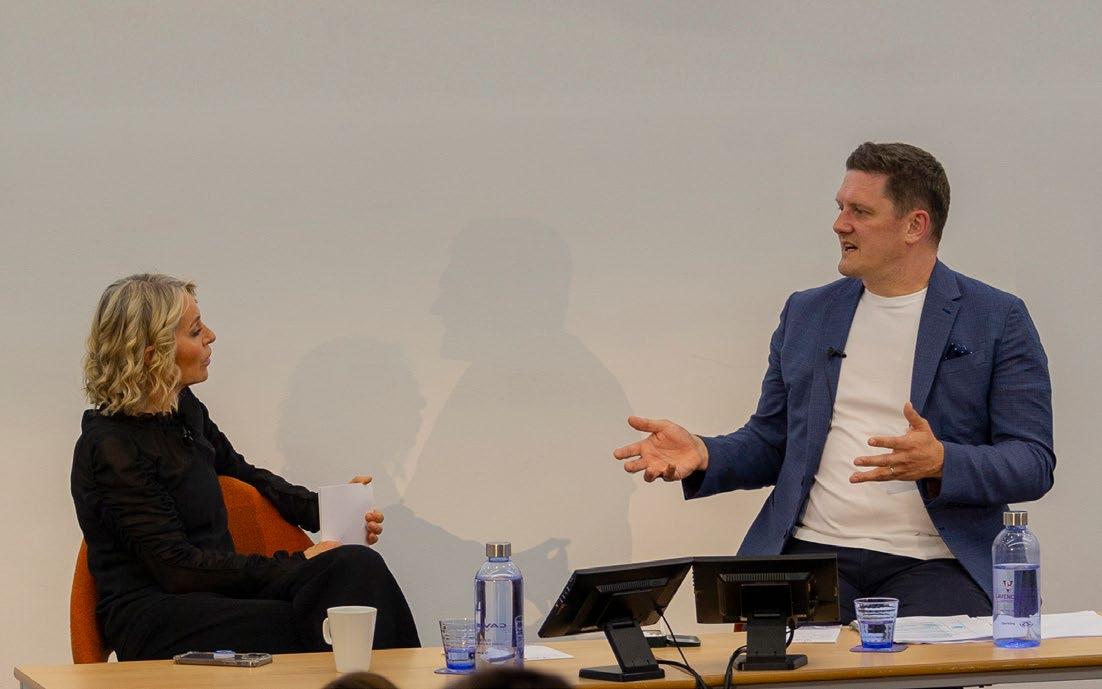
18
Paul Hampartsoumian
Sky’s content chief, Zai Bennett, tells the RTS what it takes to make standout TV such as Gangs of London and I Hate Suzie
‘More
‘[FOR] THE GENRES WE WORK IN… WE TRY TO MAKE BEST-IN-CLASS PIECES’
scripted and unscripted, committed to giving customers value for money when money was tight. “If you look at the sorts of things we are making, across all the genres, you can see the ambition, the scale and the investment,” he said. “We do not make loads.… We are very specific about the genres we work in. When we’re in them, we try to make best-in-class pieces.”
media noise become so loud that people dived in,” he said.
But HBO shows such as Succession and Game of Thrones are critical to Sky’s branding. There is continued speculation about what Sky will do when its exclusive output deal with HBO ends in 2025. It could be an opportunity for Warner Bros. Discovery to finally launch its streaming service, Max, in the UK.
try to stand shoulder to shoulder with that.… You don’t have to copy it, rather, ask yourself what the British version is.”
Bennett is a lover of high-end US TV, but he emphasised that Sky’s British flavour, evident in the shows he oversees, is a real point of difference between Sky and its rivals, particularly the US streamers.
Regarding Sky as a platform, Bennett said this gave audiences something they were “crying out for – aggregation”. He added: “People are desperately asking not to have to spend 100 days of their life surfing telly” just to find something they want to watch.
On the crucial matter of programme budgets, he insisted that his “looked really solid”. It was essential, he added, to “invest for the future – and to invest early”.
Bennett said it was a myth that Sky Atlantic’s critically acclaimed acquisitions, such as HBO’s The White Lotus and The Last of Us, were more popular than Sky Originals such as I Hate Suzie and Brassic, both RTS award-winners.
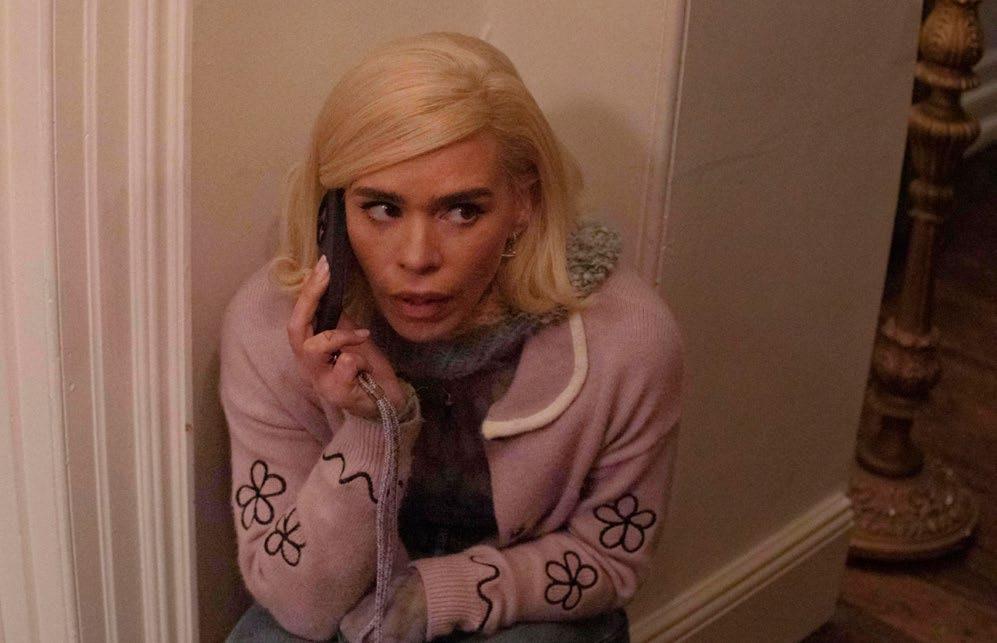
Even the ubiquitous Succession took a couple of series to become popular with UK audiences. “It did 100,000 to 200,000 in season 1, a couple of hundred in season 2, then, eventually, the
Bennett sounded phlegmatic: “We are incredibly good partners, we love working with HBO. We’ll see what it wants to do.
“The main thing for us is to try to own our future, invest in originals and have a critical mass of great shows. We are working towards that.”
He added: “When I think of what HBO gives us, there are some shows that are not replicable – The Last of Us and Game of Thrones – but, generally, Gangs of London, I Hate Suzie, Discovery of Witches and Bulletproof generate more viewers than the vast majority of shows I get from HBO.
“In general – [although] there are a couple of superstar shows – our customers prefer our own commissions in bigger numbers. There’s a style of storytelling, access to talent and storytellers that HBO has which is exceptional. Absolutely, we should
“This is an overly simplistic way of thinking of it,” he conceded, “but we’re more British than streamers generally are, and we’re probably a bit more premium than most terrestrials…
“The core of what we do is high-end telly, mostly it’s quite expensive and has to be best in class. Mostly, there is a lot of Britishness about our originals – but buying the best of the US is equally important to us.”
Where, then, was the UK market for scripted, as the content boom shows signs of subsiding? “Historically, it’s been insane, but there has been a correction,” said Bennett. “The streamers are being a lot more cost conscious, looking at what they’re making across the board.… Generally, people are being more cost conscious and more choiceful.
“We’re being more choiceful, probably making slightly fewer titles ▶
19 Television www.rts.org.uk June 2023
I Hate Suzie Too Sky
‘WE’RE PROBABLY MAKING SLIGHTLY FEWER TITLES BUT PAYING A BIT MORE FOR THEM’
Why comedy is a serious business
I’m a massive lover and consumer of comedy. It’s a genre that is really important to our customers.
It is important to reflect our audience on screen.
really well written and brilliantly acted and directed.
Comedy has got quite a broad palette. You can have propulsive, narrative pieces or more characterful pieces.
▶ but paying a bit more for them. When you’ve got fewer balls in the air you want to keep them in the air a bit longer and take more time to make those decisions. Things are slowing down a bit.”
Brassic is a fantastic show and is the best-loved comedy on any channel. It’s authentic, joyous, bloody well produced,
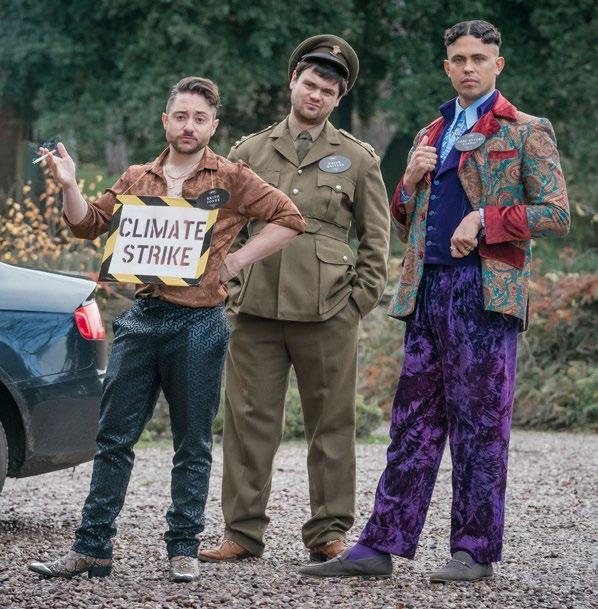
We want to have a bit of range in that, so you’ve seen Dreamland and Funny Woman
Sky’s commitment to sustainability
Sky’s commitment to sustainability
As a business we’re very mindful of it. We’re committed to going carbon neutral by 2030. Sky Glass is the world’s first carbon-zero-certified television…
We’re happy to do the more nudge stuff as a broadcaster. There is a daily climate-change show on Sky News.
More often than not, the embedded stuff works better, where you make it normal [in storylines], which is a bit harder for us because we don’t have soaps. But we try really hard where we can. We also try and make the productions themselves sustainable.
What’s on at Bennett’s house
For pleasure, I tend to end up watching American things because I don’t want to think: ‘Oh, they should have done that, they should have done this.’ It is distant enough not to be work –although, obviously, it is work.
I’m enjoying The Offer, which is a Paramount+ show.
I am a massive fan of Taskmaster I got pitched it at the BBC but didn’t do it. Now, it’s probably one of my favourite entertainment shows.
As some streamers embrace more traditional TV tropes – introducing advertising and holding back episodes for weekly release – Sky’s USP appears to be unchanging.
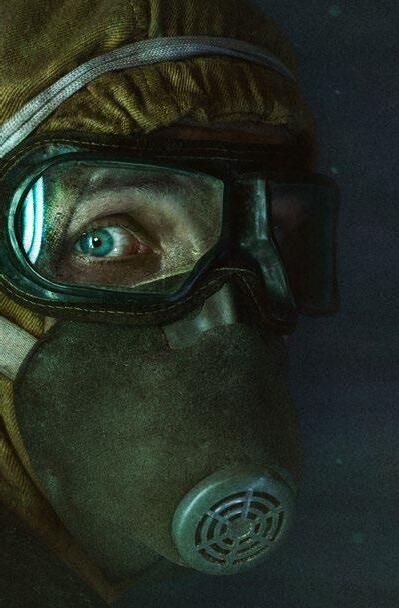
“Sky is a premium product, it’s not a streaming product, we have one of those in Now TV. They have different economics to us. They are going through their own business plans and working out how they can make those make sense. You can see what’s happening at Netflix and Disney. They are having a more choiceful moment,” he noted.
One highly anticipated new Sky drama is the Jacobean costume saga Mary & George, starring Julianne Moore and Nicholas Galitzine. “It’s about power, politics and sex,” said Bennett. “It looks stunning, and it’s got swagger. It’s not your normal period drama. Our shows have to be really distinctive. Other people make nice period drama. That’s fine. We don’t need to do that… There’s tons of sex in it, and the talent is amazing.”
As for when in the creative process he knows that an idea is working, he
20
Brassic
Chernobyl Sky Sky
said it was different for every genre. For Chernobyl, Bennett started to have good vibes about the series as soon as he read the script. But he warned that, even having a good script, “there are still plenty of ways to mess up” a show.
He recalled: “I knew Chernobyl was going to be OK when I saw the first casting tape.” He says he thought: “I don’t know what it is, but I think I want to watch more of it. Let’s see what we can do with it.”
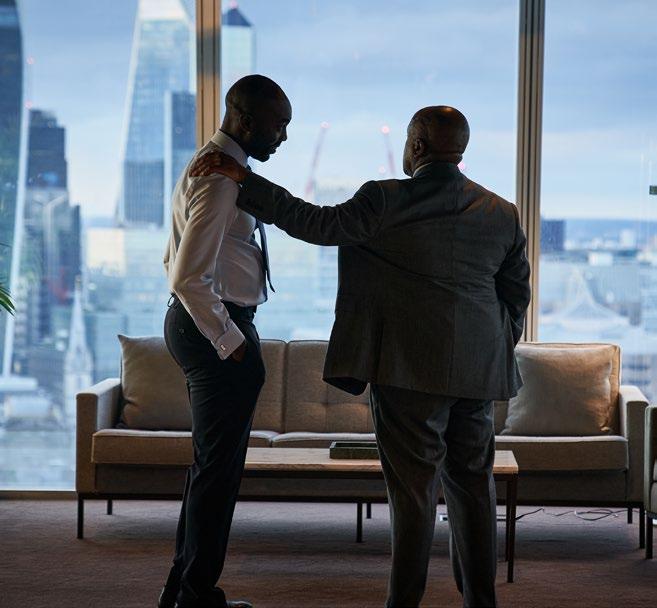
Chernobyl turned out to be a seminal show for Sky, winning countless awards – it dominated the RTS Craft & Design Awards in 2019.
Having different voices involved in the commissioning process was essential: “It’s not just me, that would be mental.” He recalled how, when running BBC Three, he commissioned the reality show Don’t Tell the Bride, despite it not being top of his viewing menu. “I’m not naturally someone who wants to watch a show about hapless grooms putting on a wedding but there is a truth in that show, and there’s artistry and there’s
QUESTION & ANSWER
joy. That’s why you have lots of commissioners and lots of diversity of voices.
“That’s why we have an Assistant Commissioner Scheme, where we’re making sure we’re getting even more diversity. My job is about making creative headroom. Sometimes, it’s about getting out of the way, sometimes it’s about strapping rockets to something, sometimes it’s about being a quality controller.
“I’m trying to help people, mostly the commissioning team and production companies, to do their best work.”
Were there any shows he wished he hadn’t commissioned? “Oh, yes,” he said to much audience laughter, “Loads of those”. ■
Report by Steve Clarke. ‘In conversation with Zai Bennett’ was an RTS National Event held at the Cavendish Conference Centre, central London, on 16 May. The interviewer was broadcaster Nikki Bedi. The producers were Sally Quick and Clare Laycock.
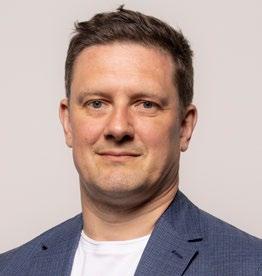
Diversity: more than box ticking
QWhat are you doing to empower your commissioners to ensure your commitments to diversity and inclusion are more than a box-ticking exercise?
AZai Bennett: There’s the hardedged numbers. Since we announced them in 2020, we’ve got a lot better on those metrics. A lot of this is behind the camera as opposed to in front [of it].
In front of the camera, we need to reflect society. We don’t have a diverse show. We have shows for our customers. Sometimes they are very diverse like Save Me… but all our shows need to be shows that work for our customers… Bulletproof, for example, had two leads who were black cops. We didn’t do those shows because we were ticking boxes, but because they were great, authentic shows.
Money is never the problem. We’re happy to spend money.… If a show can’t quite hit our numbers, we’ll say: ‘What can we do? Have a shadow director? Can we do different roles on this, different heads of department? Can we train people?’
There’s always bespoke [solutions] because every show is different. The Assistant Commissioner Scheme is a big intervention… We’re lucky that we’re making enough stuff so that people can have proper, meaningful jobs… From the top down, it’s a priority.
21 Television www.rts.org.uk June 2023
‘BRASSIC [IS] THE BEST-LOVED COMEDY ON ANY CHANNEL… AUTHENTIC, BLOODY WELL PRODUCED’
Paul Hampartsoumian
Gangs of London Sky
Top of the poppermost
Top that, Sweden!” joked Kate Phillips, challenging the hosts of next year’s Eurovision Song Contest. Just a few weeks earlier, a worldwide audience of 162 million – an all-time high – had watched Loreen win the contest for a second time.
Phillips, the BBC’s Director of Unscripted and Eurovision Lead, was talking at a packed RTS event that threw a spotlight on how the corporation staged the Europop jamboree at the Liverpool Arena in such spectacular fashion.
Of course, as the Turin 2022 winner, Ukraine should have been hosting the contest, but the European Broadcasting Union decided this would be impossible given the Russian invasion of the country. So, up stepped the UK (no
wins since 1997), which had finished second with Space Man by Sam Ryder in 2022.
Phillips is a huge Eurovision fan and it had long been her ambition to put on the contest. “It was incredibly exciting for me but also daunting because there have been some wonderful Eurovisions. As the BBC, we want to ramp it up a notch and… deliver the best Eurovision.”
BBC Studios’ Lee Smithurst led the creative side of the three live television
shows – two midweek semi-finals and the Saturday-night final on 13 May.
As the UK was hosting the contest on behalf of Ukraine, both countries were involved in the planning. “We always wanted it to be a celebration and the Ukrainians wanted the same thing,” said Smithurst.
Freckled Sky, a multimedia effects company, launched by Ukrainians in Chicago, worked on the contest, as did Ukrainian broadcasters and crew. The Kyiv-born singer Julia Sanina co-hosted the final, alongside Graham Norton, singer and TV presenter Alesha Dixon and actor Hannah Waddingham.
Best known for her role in Ted Lasso, Waddingham had never previously presented a TV show. She was an interesting choice (Smithurst was reluctant to take the credit, but it was his idea, Phillips revealed at the RTS

22
‘
The RTS learns how the BBC team behind Eurovision delivered a spectacular chart topper at Liverpool Arena
Hosts Graham Norton, Alesha Dixon, Julia Sanina and Hannah Waddingham BBC
event) and one that was fully vindicated.
Audiences loved her comedy noises, faces and dances, and were awestruck at her command of languages. “What you saw at Eurovision is exactly what she was like in her screen test – it was one of those no-brainers; you see the footage and you think: ‘She’s a star.’ She just lit up the screen,” said Smithurst.
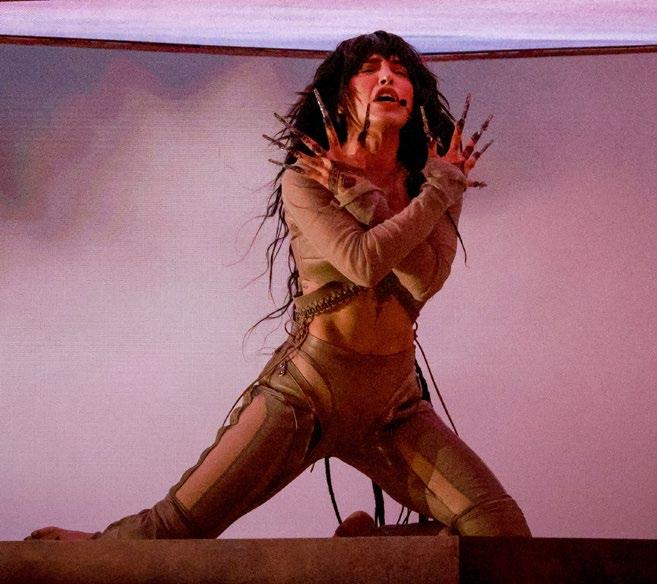
Although the show was made for a worldwide TV audience, the production had to follow BBC editorial guidelines.
“It was a really tricky balance – you don’t want to sanitise Eurovision because we all watch it for those bonkers moments,” said Phillips.
Memorably, Poland’s 2014 entry featured a woman dressed in traditional costume, performing simulated sex with a butter churner.
This year, it was the Croatian entry, performed by the satirical and provocative Let 3, that caused consternation, with the singers stripping down to their underpants and using nuclear missiles as props. It could have been worse, with Smithurst revealing: “In Croatia, they actually do go fully nude.” If they had won in Liverpool, that was exactly what Let 3 threatened to do.
Nikki Parsons (Strictly Come Dancing) was Eurovision lead director and had 30-plus cameras at her disposal “to bring the set to life. You want to get the atmosphere across at home… and the sense of occasion and excitement on
QUESTION & ANSWER
QHow sustainable was the production?
ACaroline Lloyd: Power was a key consideration… and the venue has a 100% renewable energy source. The rig, de-rig and all our back-of-house operations, which were really substantial, [such as] crew catering, media operations and hospitality, plus the outside broadcast compound, were run off [the arena’s] power. But, for the show itself, because of its magnitude, with the screens, lights (which were LED), sound and set automation… we did use generators, but it was all HVO [fossil-free hydrotreated vegetable oil] fuel… We also had a pop-up HVO filling station for all our trucks… and all our crew were staying within walking distance of the venue.
the screen. If you were at the live show, what an atmosphere – it was incredible.”
But the pressure was huge. “We just had to keep going forward,” she said. “If you start thinking about how many people are watching and how much responsibility you have, you’ll never get it done. You just have to focus, maybe, on your mum watching at home.”
Bringing Eurovision to screen was a huge technical and logistical feat, involving almost 1,000 people and 10 months’ work. Many crew spent five weeks in Liverpool before the contest.
“Everyone wanted to work on Eurovision,” said event line producer Caroline Lloyd. “For me, it was the best show I’ve ever done. As well as being challenging, it was a lot of fun.”
Parsons added: “It’s something I’ve always wanted to do but never thought I’d do it. I loved every single minute of it – the collaboration with Ukraine, the city of Liverpool, the team that we had… it was my best experience in TV.”
Phillips, who is celebrating her 30th year in television, added: “It was the best working week of my life.” ■
Report by Matthew Bell. ‘Eurovision 2023: meet the team behind the greatest show on earth’ was an RTS national event held in central London on 5 June. It was hosted by BBC One Morning Live presenter Sam Quek and produced by the BBC’s Harriet Humphries.
QWhat advice would you give next year’s host, Sweden?
ALee Smithurst: Martin Österdahl [Executive Supervisor of the contest, appointed by the European Broadcasting Union) gave us some advice. He said: ‘You should remember that time is not on your side and it never will be.’ At the beginning, you think you’ll be fine but [soon] realise that you’re constantly chasing your tail.
QDid you have contingencies in place if things went wrong?
ALee Smithurst: We had various VTs that we’d made… of different lengths [to play in case of a problem live].
ANikki Parsons: In the dress rehearsals, we had to go to contingency [plans], but in the live shows it went so smoothly.
QWhat would you have done differently?
AKate Phillips: I was really pleased with how it went… If Britain hosted it again… it would be a different show because we wouldn’t be hosting it for someone else. Having Ukraine gave us a narrative… we’d have to do that differently next time.
23 Television www.rts.org.uk June 2023
Sweden’s winning entry, Loreen BBC
The magic of Granada
The lack of training grounds for talented new TV writers and directors has been branded “intolerable” by David Liddiment, one of the most influential commissioners and broadcasters of the past 40 years with a career that has spanned both ITV and the BBC.
Delivering the Anthony H Wilson Memorial Lecture to the RTS North West, he recalled his own career development and that of luminaries such as Sally Wainwright, the creator of Happy Valley, who began her career as a Coronation Street writer.
Liddiment told his attentive audience at Manchester Hall how the people who ran Granada Television had allowed him to take on new roles with little experience. He joined the Manchester-based ITV company
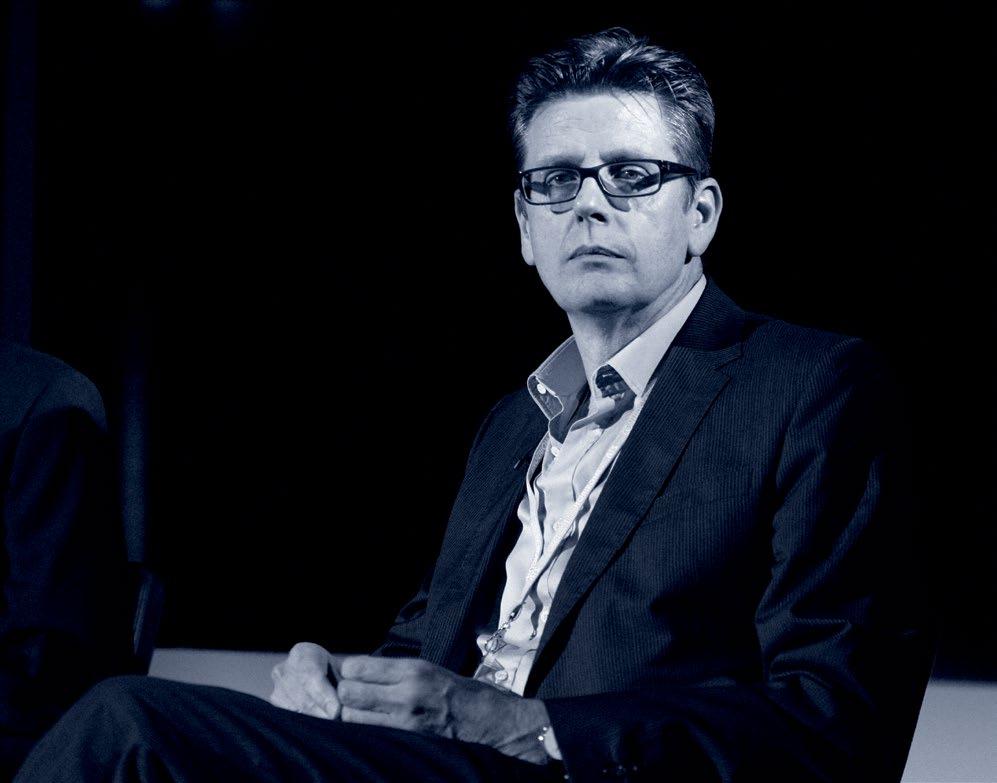
– widely admired not only for Coronation Street but for its current affairs and drama serials such as Brideshead Revisited – in 1975, aged 23, as a scriptwriter in the promotions department.
He worked his way up as a factual researcher and director before becoming executive producer on Coronation Street and Head of Entertainment, developing ITV hits that included Stars in Their Eyes, You’ve Been Framed! and This Morning
At the same time, writers such as Kay Mellor and Paul Abbott graduated from Coronation Street to Children’s Ward, Cracker, Fat Friends and more.
During a post-lecture Q&A with producer Nicola Shindler, she remarked: “We don’t have those training grounds now. There are very few places any more for people to experiment and be brought through.”
Liddiment replied: “That’s an
intolerable situation. We have a responsibility to exercise their muscles.”
The audience heard how the likes of Waterloo Road and Hollyoaks encourage new writers. But, with the dominance of independents and the absence of in-house production departments, it is harder for them to graduate to other dramas.
Liddiment is Creative Director of All3Media, which he co-founded in 2003, the same year he was presented with the RTS Gold Medal for outstanding services to television. He has never lost his childhood passion for the so-called box of delights: “Television was just the coolest thing. There was something thrilling about watching the same thing as everyone else.”
Confiding the secret of the “Granada magic”, Liddiment said: “It wasn’t a company hung up on departments or titles, like the BBC. People were called
24
Paul Hampartsoumian
In his Anthony H Wilson Memorial Lecture, David Liddiment recalls how the ITV company fostered a unique and enabling creative culture
head of this or that, but there was no bureaucracy beneath them. They were all very accessible and hands on. Granada’s structure was not hierarchical, and its leadership was creative, not just interested in making money or building empires. They got out of bed to make great programmes and that culture spread around the building.
“Granada was an integrated producer broadcaster with everything needed to make a show on site at Quay Street. It had the right to decide what to make for the ITV network and made some maverick and risky decisions.
“Denis Forman [one of the founders of Granada and an influential executive at the company] commissioned The Jewel in the Crown, a hugely expensive 14-part drama shot on location in India. It was an extraordinary enterprise, especially as the budget depended very much on a US pre-sale and they were just not biting. Denis started filming anyway, cut episode 1 to show to PBS and got a deal.
“As a programme-maker, it was a sackable offence to talk to the sales department. Sales would tell you that it needed to appeal to a particular audience, but Denis thought listening to that led to reductive TV – it only looked back at what was successful and not forwards.
“The really talked-about, zingy shows that trigger extraordinary performances and say something important about the human condition don’t come about that way.”
Granada fostered Liddiment’s career, putting him in charge of doomed soap Albion Market, after which he executive produced Coronation Street for six years. There, he helped to nurture Wainwright, Abbott, Mellor and Russell T Davies.
He said: “Coronation Street was the most extraordinary place to bring on talent. Part of the Granada tradition was that writers of the Street graduated to other dramas… to have four top-quality writers in one place was just staggering.
“They saw something in me, too. It was a classic Granada thing to get someone with very little experience to try to save a soap opera, and then to put ITV’s most important show in the hands of someone who was only 34. They wanted to bring people on and bring out the best in them.
“People were recruited on personality more than their CV. Granada put a lot of effort into developing talent and that’s an important lesson for all of us.”
Shindler commented: “That ability to move across genres and jobs is so extraordinary and seems idyllic now when we think how regimented we are.” The producer of such series as Happy Valley, Scott & Bailey, Last Tango in Halifax and It’s a Sin added: “I joined Granada in 1993, finding a creative environment that welcomed ideas and risk-taking.
“I was a script editor on a new drama that Jimmy McGovern was writing. ITV had realised it had seven
very courageous. But I’m in huge fear that things are growing towards competitive storylines without character, and I find that very upsetting.
“I fear that television has become an industry rather than a passion. The cast is so large, and commercial pressures make it impossible to be personalised and character-based. We don’t have enough time, to be honest. I’m so proud to be a part of Coronation Street, but I want your inspiration to return.”

Liddiment replied: “I think the quality of the Street is extraordinary given they make six episodes a week. I took it from two to four episodes during my time and there was huge pressure to do more but I said no, I thought it was self-defeating. It’s harder when you are doing that volume to create something special that stands out. It’s not as distinctive and characterful as it once was.”
After Granada, Liddiment spent two years at the BBC as Head of Entertainment, then became Director of Programmes at ITV, where he launched seminal shows such as Who Wants to Be a Millionaire? He went on to become a founding and key member of the BBC Trust when it replaced the BBC’s Board of Governors in 2006.
RTS North West created the Anthony H Wilson Memorial Lecture 15 years ago to celebrate the remarkable life of the journalist, presenter, producer and director known as Mr Manchester, who had died aged 57. The first lecture was given by Russell T Davies and subsequent lecturers have included Shindler and actor John Thomson.
Liddiment directed Wilson on shows such as The Other Side of Midnight and Joy Division’s TV debut on Granada Reports. He remembered: “Granada gave Tony the space to be himself, the latitude to fail and the freedom to set up Factory Records and the Hacienda nightclub while still an employee.
hours to fill and wanted a series, so it asked Granada, and Jimmy wrote Cracker. It’s incredible now to think of it. There’s no longer the ability to say: ‘Make seven hours of anything,’ and that’s a shame.
“I never want to make telly that’s just on in the corner, I want to get under people’s skin. That’s what I got from Granada.”
Among the RTS audience was actor Shelley King, who plays Yasmeen Nazir in Coronation Street
She said: “I had a mental-abuse storyline that was character-based and
“He was hired because he was interesting and had an attitude unlike anyone else. As well as being a good reporter and a vain presenter – he loved to look at himself in the camera to make sure his hair was right – he was a director and programme-maker full of ideas.
“The fact he was able to do all these things was part of the Granada magic.” ■
25 Television www.rts.org.uk June 2023
ITV
Report by Roz Laws. David Liddiment gave the Anthony H Wilson Memorial Lecture at Manchester Hall on 7 June. The event was produced by Beautiful Productions.
‘THE QUALITY OF THE STREET IS EXTRAORDINARY GIVEN THAT THEY MAKE SIX EPISODES A WEEK’
Coronation Street
BRISTOL OUR FRIEND IN
You will have spotted the rise in Bristol voices entertaining us on TV – Stephen Merchant’s The Outlaws, Daisy May Cooper in Rain Dogs and, airing this month, Ruby Speaking, co-created by and starring Jayde Adams.
They share more than just the vernacular and location. All three series are warmly wrapped in empathy for their characters’ lessthan-straightforward lifestyles and draw strongly on the colourful and complicated city itself.
Bristol took centre stage in The Outlaws. Adams uses her home patch – the southern slopes of Bedminster and Southville – to reveal her story as Ruby in the call centre comedy.
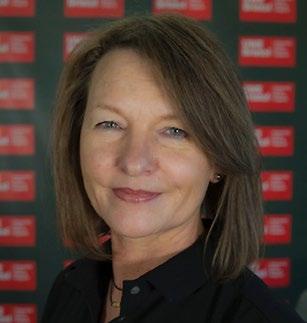
The production team at Yellow Door, which made Ruby Speaking for ITVX, was committed to casting local acting talent and providing that all-important first break for a newbie.
Dan Hiscox, who plays Craig, was cast following an open call; 650 people applied for the part and 31 people were seen. Dan’s was the second tape received. Kiera Lester, who plays Melons, is a recent graduate of Bristol Old Vic Theatre School.
No wonder the RTS West of England preview of Ruby Speaking went down a storm with the home crowd (see news report on page 34).
One of the reasons for investment in the UK’s nations and regions is to provide opportunities for varying perspectives, and to discover different voices and to tell different stories.
Naturally, there is a sizeable economic return to be had, too. We also know that there is evidence linking the arts to increased wellbeing. The
stronger the creative and cultural industries in a city or region, the more attractive it is.
Bristol is regularly rated as one of the best places to live and work in the UK. Of course, that’s not solely down to the people who are employed in the creative industries, but we do have a major role to play.
The rise of the Bristol voice is in no small part due to a £12m investment from the regional government, the West of England Combined Authority, into TBY2, an extension to The Bottle Yard Studios.
Last month, TBY2 won the Sustainable Initiative Award at Screen International’s inaugural Global Production Awards at the Cannes Film Festival for its solar rooftop array. There are
more than 2,300 photovoltaic panels. “With its solar rooftop, Bottle Yard is putting in the work to maintain studio backlot and sustainability standards and it is working with the community to make it happen,” noted one of the judges.
The development is on course to deliver 1,000 new jobs in one of Bristol’s least affluent neighbourhoods.
The range of work undertaken at The Bottle Yard Studios is like the city itself: eclectic and shot through with a creative independence. Shows include Andy’s Global Adventures (CBeebies), The Flatshare (Paramount+), Am I Being Unreasonable? (BBC One), Showtrial (BBC One), McDonald & Dodds (ITV) and, of course, Poldark (BBC One) and Broadchurch (ITV).
None of this would have happened without writers. Later this month, the first cohort from Channel 4’s new writers programme in the region will “graduate”. Channel 4 has collaborated with the BFI, Unesco City of Film, the University of the West of England and The Bottle Yard Studios to support 13 new writers from across the region. They have completed a 10-month development programme.
The West of England Combined Authority is now in the final stages of considering how a regional production fund might be established, which would be an important step forward to establishing a bigger collaborative structure.
This is our moment to leverage the creative power of the city and the surrounding region. Listen out for more Bristol voices very soon. ■
26
TV folk make good neighbours, it seems, so canny local authorities are keen to support our industry, says Lynn Barlow
Lynn Barlow is Assistant Vice-Chancellor at the University of the West of England, Bristol. She is also the English Regions Trustee of the RTS.
Lynn Barlow
Pay attention, wordsmiths
The inaugural RTS Story Conference, hosted by the North West Centre, provided valuable tips for new and seasoned screenwriters
Sally Abbott, in the first session.
A spot on a writing team for a continuing drama is often considered to be the first rung on the TV writing ladder, but the reality is that it is tough to get one.
Hollyoaks writer Jonathan Larkin cautioned against adopting his initial “cocky attitude” of: “I’ve watched an episode, I can do that.” Turned down for the show on his first attempt, he then “watched six months of episodes in two weeks, really absorbed the show, then wrote a second trial episode and got the job”.
Once there, though, you have to hit the ground running. Abbott described the writing process from story document to production script. “Very late on the Friday night before commissioning on the Monday,” she told the audience, “you get sent the document [which] includes research, notes on actors’ availability and a month’s worth of storylines.… It can be about 100 pages long.”
She continued: “There’s an A, a B, a C and a D story. You have to work out your really strong narrative drive –your ‘spine’ – through that episode… so you know where you want to go to.”
At commissioning, “there’s a lot of [trading] with other writers” for parts of the storyline, and with schedulers for the actors. “You come out of there with an agreement about what you’re going to do. And then you write it.”

Abbott said soaps involve “a lot of rewrites” because the episodes “only really start to exist as we get nearer production”.
‘Never write with a filter – thinking about what ‘they’ want you to write.”
“Love the one you are with.”
“Don’t be a wanker.” These were some of the goodhumoured but sound pieces of advice on offer from established writers at the inaugural one-day RTS Story Conference, which was packed with informative sessions featuring some of the biggest names in UK television. Taking inspiration from the nowdefunct BBC Writers’ Festival –“a wonderful annual event of writers
coming together and having conversations in a really collegiate way” –Cameron Roach, the Chair of RTS North West, urged new writers, especially those whose voices are as yet unheard, to “not feel like an imposter… and to connect with people you might not have met before”.
Our report highlights four of the day’s eight sessions.
Writing for continuing drama
A writing career is “a marathon, not a sprint”, said panellist and former Casualty and EastEnders writer
Casualty, according to Abbott, is “a Saturday-night film. So you get a little bit of serial” but create your own storyof-the-day. “Make it as exciting as possible,” she said, “because you pitch it to the people who finance and schedule it.” If your story excites them, she said: “They’ll find the money to do that helicopter crash.”
Jayshree Patel, another Hollyoaks writer, acknowledged that “a lot of people go into continuing drama as a stepping stone into writing what you really want to write.… But it’s 1,000% important to engage with what you’re doing, because you can feel it when a writer isn’t emotionally engaged.”
Citing Hollyoaks’ recent storyline about far-right radicalisation, Patel insisted: “Don’t forget all the good stuff that continuing drama can do, all the changes you can make… in ▶
27 Television www.rts.org.uk June 2023
Channel 4
Hollyoaks
▶ people’s lives.… It’s what you’re doing the job for.” ■
Session 1 was chaired by Lucy Allan, Head of Continuing Drama, Lime Pictures.
Local heart, global brand: working with the BBC
There are routes other than soaps to kick-start a writing career and the BBC has a range of ways in which writers can engage.
Jo McClellan, drama commissioning editor for the North of England, said: “I’m one of seven commissioners [and] we make shows across the whole of the UK.” Her main function is “reading submissions. I’ve got my own development slate. And I oversee the production of a number of shows.”
The commissioners discuss potential projects with colleagues, then decide who wants to take a project further [because] “some commissioners have special relationships with particular writers”.
Alice Ramsey, commissioning executive, North, explained some of the initiatives she manages: “Write Across [Liverpool is] about engaging local writers who haven’t applied to BBC Writersroom because they didn’t think it was for them.… There’s ‘Voices’, for new and emerging writers… ‘Drama Room’, which is the next level – you’ll have that bit of experience in theatre or film… Then there’s ‘Pilot’. To apply for that, you need to have an agent or a credit… It’s for writers who are very nearly on the commissioning slate.… There are also opportunities such as the Waterloo Road Shadow Scheme.”
She added: “Invite us to your shows. Send us your films to watch. We’re always on the hunt for great talent.”
McClellan said: “We’re the audience, like you. Just looking for something good. The first episode has to give you some sense of the promise of the entire show… without giving it all away. You have to give that tonal flavour.”
She continued: “You have to know why your character is really interesting, and why audiences are going to be obsessed with them. And that there’s enough ‘event’ to keep you powering through – a BBC hour [takes] a lot of story.”
For Ramsey, if “it’s a world or a territory that’s not been seen on screen before… that’s what pulls me in. Match that with the writer’s brilliant character writing, and sparky, unfiltered dialogue… Align those things with [a script] that
comes from a place of truth, and there’s specificity to it… and the audience will completely grab it.”
McClellan recommends writers consider iPlayer when preparing a pitch.
“When you scroll, what catches your attention?... What’s your ‘thumbnail’ [iPlayer image] going to be?”
“Overnights aren’t really a thing any
have to be Jack Thorne or Russell T Davies to make an enormous splash on Channel 4. Pete Jackson was an actor for many years, but he’d written [award-winning] radio. Somewhere Boy was his first television series, for which he won a Bafta.”
She added: “He’s a talent working with the right producer. My advice… is
more,” she said. “It’s a 30-day iPlayer figure.… We can showcase something on BBC One, repeat it on BBC Three, and put it up on iPlayer.”
And, she said, writers don’t need to be concerned about budgets. “We partner with other [companies] to make the show what it needs to be.” ■ Session 2 was chaired by Yasmin Ali, Development Editor, Rope Ladder Fiction.
Keeping ahead of the curve with Channel 4
Once writers have established the beginnings of a track record, it becomes easier to approach streamers and broadcasters other than the BBC.
Channel 4’s Head of Drama, Caroline Hollick, is proud of its annual schemes, such as 4Screenwriting for writers with no broadcast credits and 4Stories, which aims to bring on writers and directors from diverse communities.
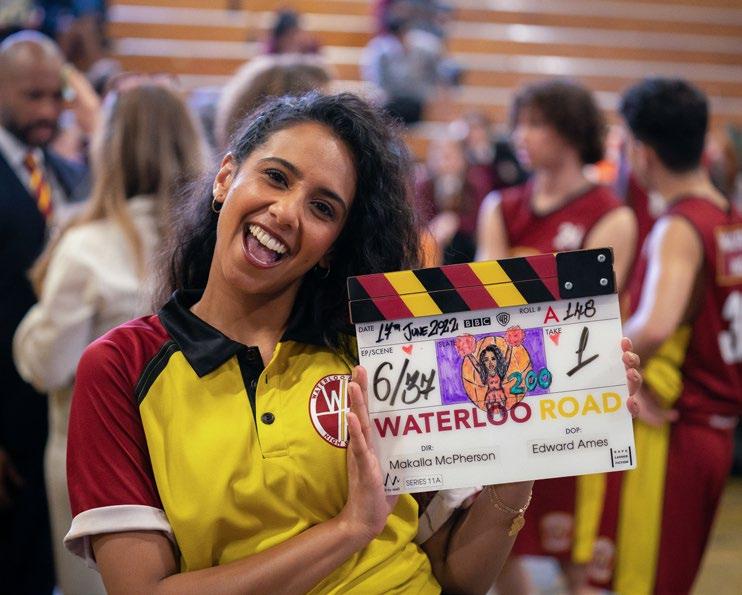
She told the RTS: “Somewhere Boy is testament to the fact that you don’t
find those producers and script editors who will really understand and support you.” Having learned everything she knows from “legend” Nicola Shindler, Hollick believes what makes a good indie producer is someone who “understands story so fundamentally that they inspire the best in writers… and they’re the ones I want to keep working with.
“If there’s a difference between the scripts that go into development… and the shows that go all the way through the process [into production], it’s… the central narrative drive.”
But [Channel 4] “can only take ideas from producers, we can’t take them from individual writers,” she said.
“If I don’t know the writer, I’ll ask for a sample script, because it’s very hard to read a story document without a sense of the voice of the writer.”
“Have a really, really good spec,” she advised. “If you have a spec that’s not getting you anywhere, junk it and write a new one.”
28
BBC
Waterloo Road
Channel 4 makes only four or five new dramas a year, but Hollick confirmed that it is still prepared to take risks. “If we can’t take risks, who will?” Studying data, she said, proves that “Channel 4 speaks directly to a UK audience who want to be challenged and are incredibly sophisticated... Our role is to shine a light on who we [in
that the two genres of comedy and drama are converging and combining.” Citing The Bear on Disney+ and HBO’s Succession, he said: “I think of it as ‘scripted with a smile on its face’.”
He has directed new writers to Sky Comedy’s open scheme in collaboration with the Birmingham Rep theatre. Mountague said: “We do eight short-
tend to cut through. [BBC One’s] The Responder, for example, feels like a very local story but it’s got many universal themes… they are the kind of things we’re looking for.... What works locally will work internationally.”
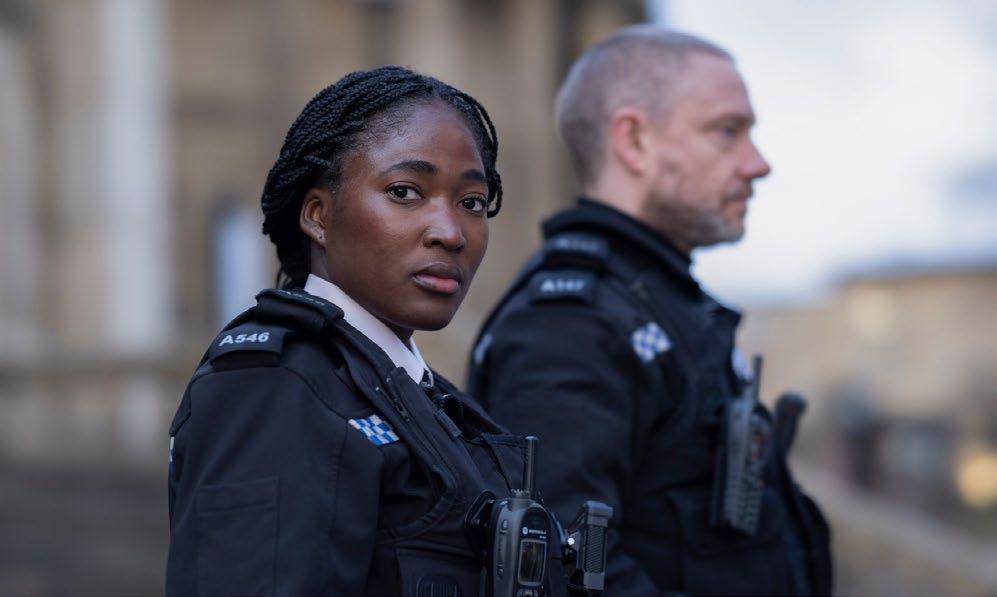
Mountague, joking that Sky’s Walesset comedy Stella needed subtitles even for its UK audience, agreed that
BBC
the UK] are today.… We are here to push the boundaries, for sure.” ■ Session 3 was chaired by Kristian Smith, Managing Director, Leopard Pictures.
Demystifying the commissioning process
The next step for writers building a career is to get an agent, and that is normally how they would approach Jon Mountague, Director of Comedy at Sky Studios.
Brassic, “one of our most successful pieces”, said Mountague, came about because he was in the market for a Shane Meadows piece: “A lot of This Is England, although pretty bleak in the main, was brilliantly comic at times, and those bits really spoke to me.”
Meadows was busy and turned down Mountague, but the idea for Brassic [co-written by Joe Gilgun and Danny Brocklehurst] arrived in Mountague’s inbox the same week.
“I’m really interested in this notion
form plays, performed to a living, breathing audience… because, in comedy, [writers] don’t often read things out to an audience. The first time it happens is the read-through for the show and, if people aren’t laughing at the read-through, that’s really scary. So, it’s important in comedy for writers to understand laughter and how it works.”
Liam Keelan, Senior Vice-President of Original Content for EMEA, told the audience that writers approaching Disney+ “tend to come via production companies pitching us ideas, whether that be a script, an outline or an ‘are you interested in this subject?’.
“We’re a small team so we discuss ideas on a weekly basis.… We’re completely story-led… whether it’s drama or comedy, and we’re looking for those ideas that feel distinctive and aren’t being done by other people.”
He added: “It’s about getting a dialogue going. Once we get to the next stage, we’ll talk to the writer.
“Local stories that feel distinctive do
comedies often don’t travel, but noted: “It’s not an absolute priority for us to sell a show globally.”
What he is looking for is “that sweet spot between the mainstream and the credible. Between Mrs Brown’s Boys and Fleabag. If it’s too niche, we’re not getting bums on seats.”
For Keelan, too, it was about bums on seats. But he stressed that it was also important to make room for wild cards. “It would be a really depressing world not to have space for the odd one… where you feel like: ‘Oh my God. There’s just something in that idea, and it would be good to give it a go and see where it leads.’” ■
Session 4 was chaired by Hannah Rodger, Development Executive, BBC Studios.
Report by Carole Solazzo. The one-day RTS Story Conference was held at the Everyman Theatre, Liverpool, and hosted and produced by RTS North West in partnership with the Everyman Theatre, WoWFest, BBC Writersroom and Culture Liverpool.
29 Television www.rts.org.uk June 2023
The Responder
If, this summer, you peruse Sky TV and land on a mixed martial arts (MMA) fight, don’t assume you are watching Sky Sports. Hoping to take advantage of the increasing popularity of full-contact fighting, Sky Documentaries is airing several related programmes for which aficionados will want a ringside seat.
The documentaries shine a light on hidden stories of the sport told through different formats. The Good Fight Club is an observational documentary series that follows members of Team Underground, a London MMA club. Right to Fight, from documentary-maker Raw (The Tinder Swindler, Three Identical Strangers), is a deep dive into the pioneering world of women’s boxing in 1970s America. Also airing later this summer is The Ricky Hatton Story, about the celebrated British boxer.

Together, they exemplify Sky Documentaries’ ambition to provide outstanding, original films; other soonto-air, long-form content includes films on the Lockerbie tragedy, Greenpeace, and decathlete Daley Thompson, who won two Olympic gold medals.
Poppy Dixon, Sky’s Director of Documentaries and Factual Commissioning, says: “Our tagline for the channel is ‘the story behind the story’ and that encapsulates what we look for: something that goes deeper than the top line, [with] truly original stories that I feel I haven’t been seen before.
“Sport is really important to us and for our customers. I’m looking for stories they might not expect to see, that take them to slightly unexpected places, as opposed to the day-to-day sports content you get on Sky Sports.”
Sports documentaries have a rich history and can extend well beyond a specific sport’s niche. They have proved their ability to change the national conversation (as with BBC’s The Real Mo Farah), define key moments in British culture (Gazza, also BBC) and
Sky comes out fighting
highlight sport’s deeper relevance (Netflix’s Sunderland ’Til I Die).
The Good Fight Club, which is made by Bafta-winning Century Films (Drinking for England, Feltham Sings) is hoping to follow in these illustrious footsteps. The series tracks budding fighters as they tackle the ascent from their south London gym to the spiritual home of MMA in Las Vegas.
The seed of the idea came from Jack Retallack, the series director, who trained at the gym, where he met
the motley crew of characters whose journeys we follow.
Dixon says: “Jack and Brian [Hill, executive producer] came to us with this brilliant sizzle, and… pitched it as a kind of Cheer [the 2020 Netflix documentary series on cheerleader squads that became an unlikely sensation) for MMA.” MMA is a solo sport, unlike cheerleading, but, says Dixon: “This group of fighters operates as a team because they’re so invested in each other’s success. That gives it a shape.”
30
Shilpa Ganatra gives a blow-by-blow account of two new documentaries that aim to give a fresh perspective on the pugilistic art
Ray Howard/AP/Sky
Right to Fight: lightweight boxer Marian ‘Lady Tyger’ Trimiar of the Bronx in 1974
Recorded over eight months last year, each of the four hour-long episodes tracks the team while focusing on two of the fighters. Included are: Kenny, who is also fighting for his father’s approval; Shanelle, who dreams of a better life for herself and her five siblings; and Aidan, who has overcome anorexia with the help of MMA. The series begins with Thomas Paull, who is profoundly deaf.
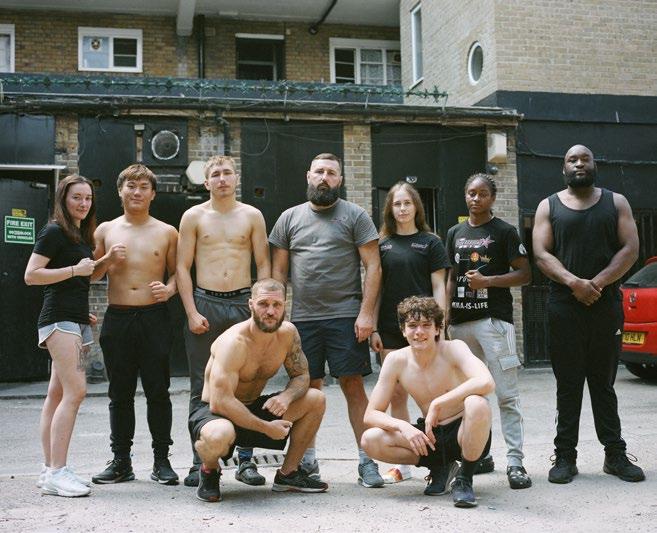
Liz Biggs, the series producer who also directed two episodes, says: “We meet him in the first episode, where he’s moving out of his home to focus on training. He’s giving everything to this: this is his dream, he has a talent, and he wants to do everything he can to reach that next level.
“Across the series, we see how his career advances, through multiple fights, to the opportunity of a lifetime: a chance to fight at the Ultimate Fighting Championship, the biggest event in the MMA world.
“If we didn’t have the opportunity to follow the fighters over the course of several months, I don’t think we would have been able to see the change in him as both a fighter and a person. It’s all the richer for it.”
Dixon says it was a “no-brainer” to give Biggs and the team the time and budget needed to give the series a fighting chance. Observational documentaries are notoriously risky, requiring sizeable resources. There is no clear structure or guaranteed payoff. But The Good Fight Club comes with a set of interesting characters, a natural story arc and high stakes. It also helps that it appeals to a younger audience.
“Because it’s an unusual commission for us, in that it’s a fully observational series and not about a famous person, I’m not setting it up against any particular key performance indicators,” says Dixon. “We just want it to do as well as it can, and for people to find it.”
Right to Fight airs later this summer and its format is familiar territory for Sky: it’s a 90-minute documentary that weaves together previously unseen archive footage, intimate interviews and verité film-making. But the subject matter beats a new path, covering the female pioneers of boxing in 1970s America. They were women who battled for the right to fight professionally at a time when it was illegal.
The idea was conceived when Baftaaward-winning director Georgina Cammalleri was working on the
Netflix anthology series Bad Sport and was led to archive footage featuring one of these trailblazers, Cat Davis. She says: “It didn’t fit the Netflix brief, but Sky wanted stories from marginalised voices, and so it was a perfect fit with Poppy.”
As this story hadn’t been told in modern times, it took a global search to find the women – who were scattered around the world, from South Africa to California – and time to earn
voice. Perhaps you’ve had all these years of being the frustrated producer and this is your moment.
“What you realise as soon as you get into that driving seat is how important everyone else is to making that vehicle move. It’s one of those cases where, the more you lean into other people, the greater the film will become.”
The result is a fresh take on 1970s boxing and the second wave of feminism. As Dixon says: “There have been
their trust and tease out their stories.
The picture that emerged was one with timely parallels, as the battle for equality in the US intensifies again. In telling their story, Cammalleri focused on the most relatable aspects of her subjects: their frustrations, their flaws and their fighting spirit.
The documentary’s relevance is bolstered by its modern feel. “I wanted something that resonated for today’s audience, so it was important to find stylistic ways of bringing it to the present,” says Cammalleri. “Sometimes, the cutting is quite fast, to keep the energy up. Also, we used the music of [Scottish experimental band] Young Fathers, and the composer worked off of that.”
As this was Cammalleri’s feature-length directorial debut, there were plenty of lessons along the way, not least that a good director relies on a good team. She explains: “When you’re creating your own project, at times you’re desperate to show your
a lot of films about Betty Friedan and Gloria Steinem and feminism in the 1970s. These women were in the same era but didn’t subscribe to that type of feminism. They probably didn’t even call it feminism – they were just doing what they needed to do. That feels fresh and direct, it’s not too ‘thinky,’ it’s pure and emotional.”
Cammalleri agrees: “Most of them are working-class women, and feminism always feels like a middle-class movement. Feeling the fight rather than thinking it is something that stands out.”
In a sport that often comes with prejudices about who the competitors are and where they come from, these alternative stories add a much-needed dimension – and that’s arguably why they carry serious clout. ■
31 Television www.rts.org.uk June 2023
Sky
The Good Fight Club airs on Sky Documentaries from 25 June. Right to Fight airs in July.
The Good Fight Club
Being left alone to work out how to make television is part of the secret to Guz Khan’s success, he has revealed. The multiple RTS award-winner was talking at the Birmingham premiere of the fourth and final series of the hit BBC comedy Man Like Mobeen
RTS Midlands co-hosted a drinks reception before a screening and Q&A for fans.
Khan said: “I wrote the first few versions of Mobeen in the Notes app on my iPhone. And on the first day we walked on set knowing nothing about how acting works. But nobody said: ‘You can’t say that.’ People can get caught up in: ‘This is the way things should be done’.
“We were pretty much left alone, though one day our producer, Gill Isles, told me not to mess around because the BBC were visiting. But I got hungry and was in Dixy getting a chicken burger when they arrived.
“Everyone says they want comedy from outside the industry, from people like us, but there’s this gap. How do you start? There’s too much lip service paid; you have to actually create opportunities.”
Khan and Isles set up their own company, Dice Roll Productions, to do just that, by helping people from working-class backgrounds to make content. They also created six jobs for Birmingham production trainees on Man Like Mobeen
Khan has won three Writer awards from RTS Midlands with his Mobeen co-writer Andy Milligan, an Outstanding New Talent award and has twice won in the Male Actor category.
A former teacher who still lives in Coventry, Khan says his family aren’t in the least
Man of the Midlands
On the eve of the final run of his award-winning comedy, Roz Laws hears how Guz Khan remains close to his roots RTS Midlands
impressed by his success, even in Hollywood productions such as Army of Thieves and Our Flag Means Death
He said: “I find it so weird to walk the red carpet at these events because, when I get back to Coventry, everyone there thinks I’m a dickhead. Mum says: ‘Are you going to do more of that TV? And people are paying you? They are stupid, then!’”
Viewers first met reformed drug-dealer Mobeen Deen as he tried to escape his troubled past and look after his little sister. But in the series 3 cliffhanger in 2020, he found himself in prison after a shocking scene
in which his friend Eight was shot dead.
Khan explained: “There are very funny moments, but we have to reflect real life. Too
on location in Small Heath, the inner-city area also frequented by Peaky Blinders gangsters. Kahn said he loves the show, but added: I don’t know where their accents were from –some of them sounded Swedish!”
many of our young men and women are dying at the hands of each other in Birmingham.”
The first three series of Man Like Mobeen were filmed
In series 4, all filming was at the disused Shrewsbury prison – no doubt to the relief of the man who rented out his house as Mobeen’s residence. “He still had people knocking on his door a year later, asking for Mobeen,” said Khan. n
Man Like Mobeen is on BBC Three and iPlayer from 8 June.
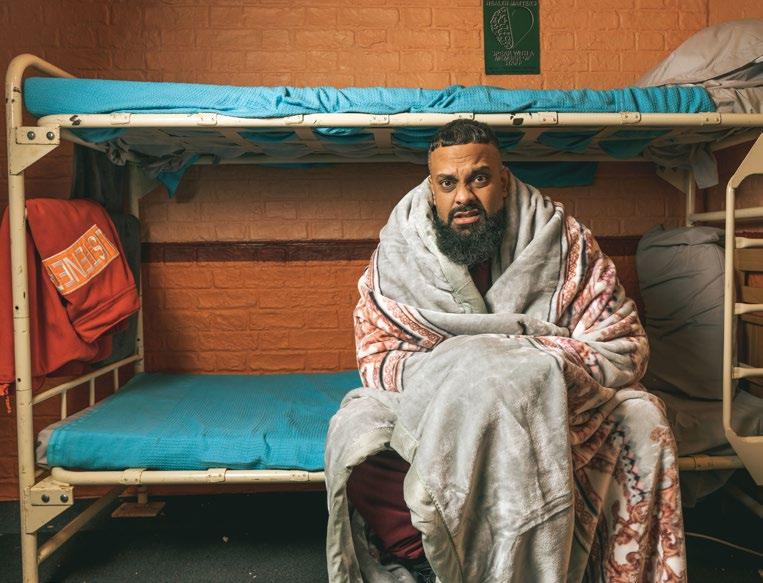
32
RTS NEWS
Guz Khan in Man Like Mobeen
BBC
‘TOO MUCH LIP SERVICE IS PAID; YOU HAVE TO ACTUALLY CREATE OPPORTUNITIES’
Iapologise profusely and unreservedly.” The apology, testament to the power of television documentary to inspire a Damascene moment, came after an RTS North West screening of Manchester-based Monster Films’ Wrongly Accused
This new CBS Reality true crime series, fronted by Louise Shorter, former BBC Rough Justice producer and founder of the charity Inside Justice, examines some of Britain’s most egregious miscarriages of justice.
First, Shorter and her associates place the failings of the original investigation and trial under the microscope. Then, in the following episode, they analyse the evidence that caught the real perpetrator.
Examining the 1975 case of Stefan Kiszko, which was recounted in the exclusive RTS screening, Shorter said: “The things that really grabbed me about it were… that the mum had fought so hard to find the evidence that would clear her son… and that so many people kept on fighting for so long to find the truth.”
Kiszko had served 16 years’ imprisonment for the sexual assault and murder of 11-year-old Rochdale schoolgirl Lesley Molseed before his wrongful conviction was finally overturned in 1992.
“The reason why this case resonates is that… Stefan could be any mother’s son,” said Campbell Malone, the Salford barrister who took Kiszko’s case through to the successful appeal.
“It’s moving,” agreed former Detective Superintendent Trevor Wilkinson, who was pivotal to Kiszko’s eventual acquittal. “And I’ve dealt with over 300 homicides.”
He was asked to reopen the case. “It struck me immediately – why had [Kiszko] been required to give so
Monster rights a wrong
many samples of semen?” he said. Wilkinson followed this lead “up the chain of science to find a man at Edinburgh University who is a worldrenowned expert on semen production”. From him, he got categorical proof that Kiszko could not have been the murderer.
Dr Edward Tierney, the original forensic physician who had requested the samples, took up the story: “When I went to examine Stefan and was told he was on testosterone and vitamin B, I said to Stefan, ‘If you had nothing to do with this, and if you produce a specimen of semen… and it comes back azoospermatic [semen with no sperm] it will take you completely out of the frame.’”
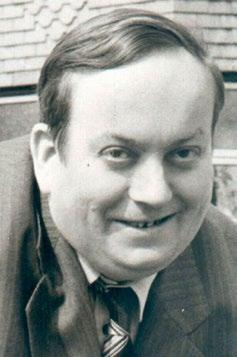
“The biggest problem… was that the police believed I was working on their behalf. Trying to convince them that I was an independent practitioner searching for evidence, whether it convicted or it removed any chance of a court case, was not tolerated.”
As a result, West Riding
Police removed Tierney from its list of expert witnesses. Seeing the story play out on screen led an audience member, who knew the Kiszko family and had long thought the doctor “complicit” in the wrongful conviction, to apologise to Tierney in the Q&A that followed.
Chillingly, Shorter and Malone believe miscarriages of justice are now becoming more, not less, frequent. “There is a duty on the police and prosecutors to hand over to the defence anything that… could support the defence case. We know from
HM Inspectorate reports… that this disclosure is not taking place,” said Shorter.
And the will to investigate wrongful convictions is diminishing, too. Malone said: “When I started to help Charlotte [Kiszko’s mother]… I was a busy criminal defence lawyer doing entirely legal aid work. But we were paid reasonably well and I could find time… to take on Stefan’s case [pro bono].”
Following cuts to legal aid, he said, “people haven’t got the time to devote to these cases”.

Shorter added: “It’s something investigative journalism has turned its back on. There are no programmes actively investigating cases of people who are in prison right now.” n
The event was held on 9 May at the Everyman cinema, Manchester, hosted by director and Monster Films co-founder David Howard, and produced by RTS North West in partnership with CBS Reality.
33 Television www.rts.org.uk June 2023
CBS
Stefan Kiszko
Carole Solazzo discovers how a Manchester indie is putting rough justice under the spotlight
‘
RTS North West
Ruby Speaking, a fresh, six-part comedy series for ITVX, previewed its first two episodes last month at a sold-out screening at Bristol’s Watershed cinema. Co-creator and lead actor Jayde Adams may have been nervous about showing it to her home audience, but it is fair to say that the sitcom went down a treat. “You were great,” Adams said to the audience. “I mean, I was better, but you were brilliant. Thank you.”
Lucy Lumsden, executive producer and MD of Yellow Door Productions, approached Adams about making a show seven years ago. “I was very lucky to spot Jayde, and it really was a kind of epiphany moment, of just feeling that Jayde’s got a magic touch,” she said.
Ruby Speaking was inspired by Adams’s own experience of working in a call centre. When it came to shooting, Adams found she wasn’t alone: “Loads of cast and crew on this project have worked in call centres.”
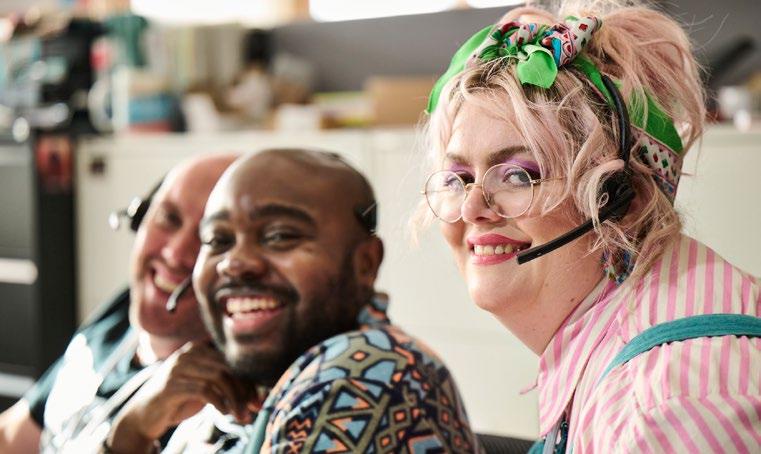
Many of them were also united by the city in which the comedy is set. “There is no one more Bristolian than us four here,” Adams said, sitting among her castmates Joe Sims, Dan Hiscox and
Bristol born and bred
Kiera Lester. “The noise when we’re talking to each other is indecipherable.”
Some of the talent was found thanks to call-outs on Adams’s social media. “It was amazing to see how much talent is in this city,” she said. Hiscox, who plays Craig, described his casting process succinctly. “I was at a bus stop... and now I’m here.”
Even the costumes are influenced by Adams’s roots.
“I know [Bristol] and I know what the women look like in it…. We wanted to reference how wonderfully colourful and creative this city is.”
Discussing auditioning, Sims said: “The environment that you guys fostered in the room was excellent, it allowed you to be creatively brave.” This open-door policy continued during filming. Adams said: “If someone felt their voice wasn’t being
Campbell relives key career moments
RTS Northern Ireland
heard, they could come and speak to me.” The positivity shows on screen, suggested Sims: “There’s something about this show that is inherently good. It’s a hug.”
“Every TV show is about everyone leaving to find their fame and fortune,” said Adams. “We wanted to make a show about all the people that stay behind and keep the lights on.”
Seraphina Allard-Bridge
Northern Ireland
Chair Fiona Campbell discussed pivotal moments from her career, in conversation with Sheila Robinson, a leadership coach, at an RTS NI session, “Making your own luck”.
Campbell, who was promoted this year to Controller, Youth Audience, BBC iPlayer and BBC Three, recalled her move from researcher on the BBC Two business show The Money Programme, where she
couldn’t see a way forward, to assistant producer on BBC One’s Watchdog
“I was not passionate about consumer affairs journalism, but that job was an opportunity to move on and break out,” she said.
On Watchdog, she learned to self-shoot and edit, and gained experience of live studio production – skills that helped her build her career.
“You’ve got to be willing to compromise and see the
upside trade-off in moving to a completely separate universe,” she said.
Campbell later took up a contract with ITN at Channel 4 News. She was not “a news obsessive”, but stayed for five years. “I learned a lot working with Jon Snow and in live television. I learned things that I didn’t even know I needed to learn.”
Campbell returned to the corporation as Director, Digital BBC News, and then
successfully applied for the job of Controller of BBC Three. “I hadn’t done any drama, but I had worked a load in digital content with Facebook, Apple News and Snapchat. A lot of people hadn’t done that,” she said.
Recalling the interview, Campbell added: “The core thing is being able to tell the story of what you are going to deliver in the job… I can’t underline that enough.”
The RTS session, in Belfast in late May, was part of the BBC Academy’s “Production Unlocked” series.
Matthew Bell
34 RTS NEWS
ITVX
RTS West of England
Panellists Joe Sims (left) and Jayde Adams (right) in Ruby Speaking
David rarely slays Goliath in the tech world but, as the new Channel 4 drama Mobile 101 reminds us, sometimes the little guy can triumph, at least for a time.
The six-part Finnish series tells how Nokia – at the time almost unknown outside its native Finland and largely known there for making rubber boots – took on the US giant Motorola, built an iconic phone and became the world’s largest mobile phone manufacturer.
At an online RTS London event last month, three of Mobile 101’s key creatives spoke to Walter Iuzzolino, co-founder of Walter Presents, Channel 4’s foreign drama strand. Mobile 101 has enjoyed success far beyond Finland: as well as being picked up by Walter Presents for UK viewers, it has also been bought by Disney+.
Created and written by Maarit Lalli (The Sixth Time), Mobile 101 was the first drama taken on by Rabbit Films, previously a factual producer, after it hired Minna Haapkylä as head of scripted content.
Haapkylä said: “When Maarit came to me with this incredible story, I thought, ‘Why has someone not told it already?’ It was an easy step to take to make a TV series.”
Lalli had long been fascinated by the miraculous rise of a company on the back of
Nokia’s rise… and fall
A new drama offers a sharp and entertaining take on the Finnish phone company’s ambition. Matthew Bell reports.
a new invention – the mobile phone – and its subsequent dramatic fall. She originally wanted to make a film, but Haapkylä, who executive produced the drama, felt the “subject was [too] huge”.
Lead actor Sampo Sarkola (Bordertown), plays Nokia CEO Jorma Ollila. For Sarkola, the attraction was to play a character in a “position with such power”, but also to find “the things in the character that
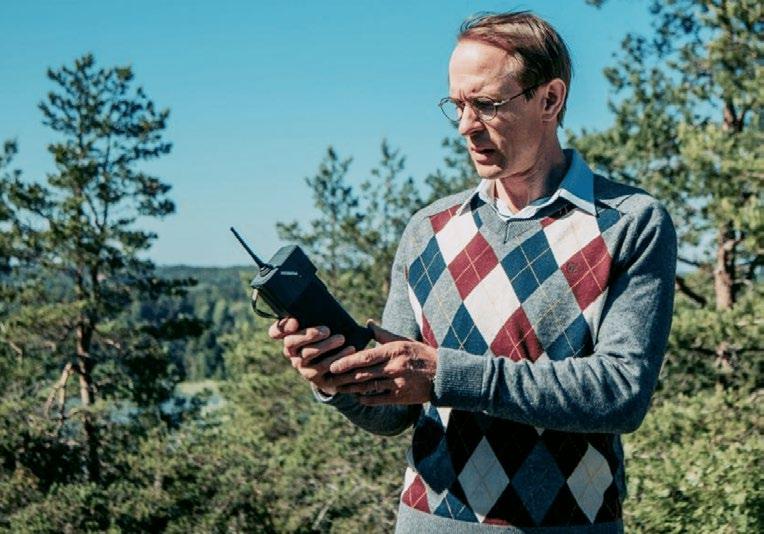
make him vulnerable and interesting for the audience”.
Sarkola talked to former Nokia employees, but was overwhelmed by the amount written about the CEO. Nokia “was such a big part of the Finnish economy, I realised I couldn’t take it all in. I followed the script, of course, and tried to make him as human as possible.”
The first season of Mobile 101 (there are two more to come)
Shot by their own phone
n Camerawoman and trainer Deirdre Mulcahy began her ‘Production in your pocket’ session for RTS London by sending everyone out of the room to record 20-second smartphone interviews.
It served as a jumping-off point for a look at examples of work by Steven Soderbergh
and Ridley Scott shot on smartphones to demonstrate how far these devices can go in the hands of expert cinematographers.
Mulcahy revealed how to get the most out of these powerful ‘entertainment devices’. Tips on framing, sound and storytelling kept
the audience enthralled. A full house used the Q&A to ask about squeezing out the most from their iPhones and the best editing software to use. The event was produced by David Thomas and held at the University of Westminster in mid-May.
Phil Barnes
aired in Finland last year and tells the story of Nokia’s early days. Season 2, which has not yet started shooting, will follow its rise and entry on to the world stage; the third, on its fall, is in development.
Mobile 101 is thoroughly researched. ‘I love facts and, if something has happened, I want tell it as [it was], but the personal lives of the characters are from my screenwriters’ heads,” said Lalli.
For season 1, with Nokia on the up, Haapkylä said, “everyone was really happy to talk about those times”. She acknowledged that it may be different for the succeeding series, when the company’s fortunes dip: “The story becomes harder to tell.” n
The online RTS London event was held on 3 May and produced by Damien Ashton-Wellman. It can be watched at: https://bit.ly/ rts-nokia Mobile 101 is available on Channel 4.
35 Television www.rts.org.uk June 2023
Channel 4
RTS London
Sampo Sarkola in Mobile 101
RTS CENTRE AWARDS
Martin wins at home
Belfast actor James Martin – who has enjoyed global success for his portrayal of Lorcan in the Oscar-winning short film An Irish Goodbye – took home the Brian Waddell Award for his outstanding contribution to the industry at the RTS Northern Ireland Television Awards this month. The black comedy about two estranged brothers was shot in Northern Ireland.
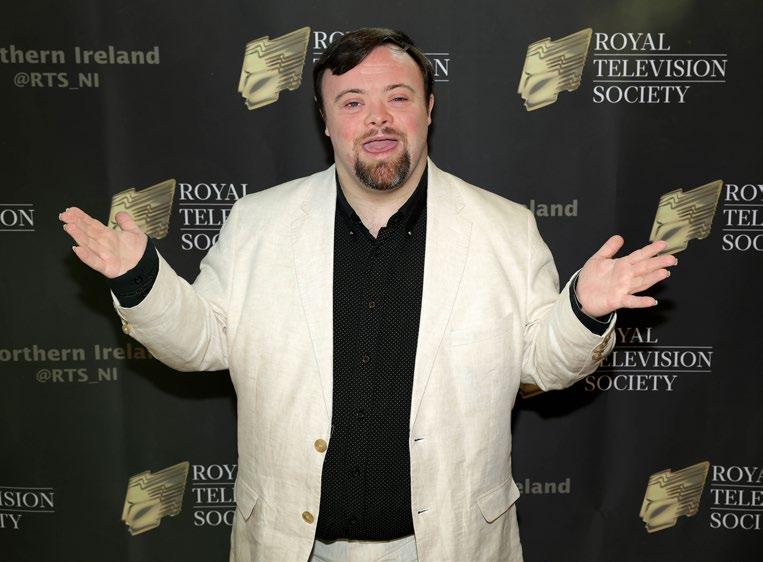
Martin, the first leading man with Down’s syndrome to appear in an Oscar-winning film, said: “It’s absolutely wonderful to receive this recognition in my home town. I hope my success encourages more young people like me to follow their dreams as I did.”
In March, Martin took home the Outstanding Newcomer prize at the RTS Republic of Ireland Awards.
RTS Northern Ireland Chair Fiona Campbell said: “It is a real pleasure to celebrate the incredible talent of our very own James Martin. As an industry, we have a unique platform in which we can smash prejudice by
ensuring that we are inclusive both on-screen and behind the cameras.”
The eighth RTS Northern Ireland Television Awards were held at City Hall, Belfast, and hosted by homegrown drag queen Blu Hydrangea, who found fame on RuPaul’s Drag Race UK
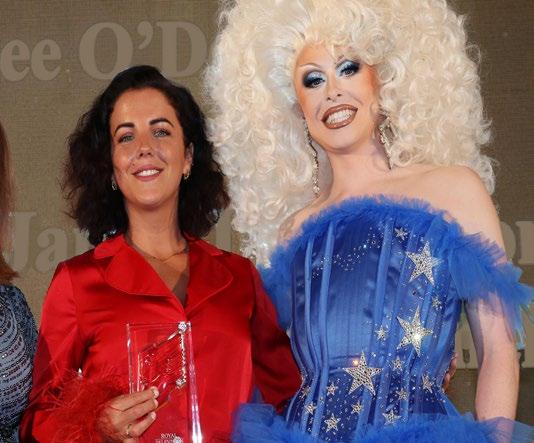
The third and final series of Channel 4 sitcom Derry Girls, made by Hat Trick Productions, took the Comedy prize. One of the show’s stars,
the On-screen Talent award for The Real Derry: Jamie-Lee O’Donnell, which was made by Tyrone Productions.
BBC Northern Ireland enjoyed a productive night at the awards, picking up the Entertainment award for The Belfast Mixtape: Songs from Lockdown and the Current Affairs prize for Spotlight: The Babymaker Uncovered
A number of BBC commissions also received recognition: Waddell Media’s The
RTS Northern Ireland
Television Awards winners
Brian Waddell Award•James Martin
Drama•Doineann DoubleBand Films
Comedy•Derry Girls•Hat Trick
Productions for Channel 4
Entertainment•The Belfast Mixtape: Songs from Lockdown•BBC NI
Factual Entertainment•The Fast and the Farmer-ish•Alleycats TV for BBC Three
Lifestyle/Features•Chronicles of Strangford•Waddell Media for BBC NI
Specialist Factual•Brian Friel: Shy Man, Showman•Walk on Air Films and Ronachan Films for BBC NI
Documentary•Young Plato: The Philosophy Boys of Ardoyne•Aisling Productions and Soilsiu Films
Current Affairs•Spotlight: The Babymaker Uncovered BBC NI News Coverage•UTV Live: Dying on the Streets•UTV
On-screen Talent•Jamie-Lee O’Donnell, The Real Derry: Jamie-Lee O’Donnell• Tyrone Productions for Channel 4 Children’s/Animation•Silverpoint Zodiak Kids & Family Productions UK for CBBC
Original Music Score•Andrew Simon McAllister, Nowhere Special
the Lifestyle/Features award; The Fast and the Farmer-ish from Alleycats TV, Factual Entertainment; Walk on Air Films and Ronachan Films’
Brian Friel: Shy Man, Showman, Specialist Factual; and Zodiak’s sci-fi drama Silverpoint for CBBC, Children’s and Animation
Irish-language crime drama Doineann from Belfast production company DoubleBand Films won the Drama award, while Aisling Productions and Soilsiu Films took home the Documentary prize for Young Plato: The Philosophy Boys of Ardoyne
Gareth McGreevy, Chair of the RTS Northern Ireland Television Awards, said: “The high quality of this year’s entries is hugely reflective of our dynamic creative community. The judges had a tough time deciding the eventual winners.”
The awards were sponsored by Belfast post-production house Ka-Boom and supported by BBC Northern Ireland, Northern Ireland Screen and Channel 4.
Matthew Bell
36
James Martin
William Cherry/Presseye
Jamie-Lee O’Donnell and Blu Hydrangea Presseye
Northern Ireland
Students get sound and vision lesson
An event at Plymouth Arts Cinema turned the spotlight on postproduction, with two experts from leading indie Twofour offering students a peek into industry practice.
Speaking after the RTS Devon and Cornwall “The secrets of finishing” masterclass last month, Sharney Adams, senior colourist and Head of Online at Twofour, said he had tried to “demystify some of the things we do to bring… the raw camera footage to what you see on television”.
Using his work on the BBC Three gay dating show I Kissed a Boy as an example, he highlighted the importance of “working out what
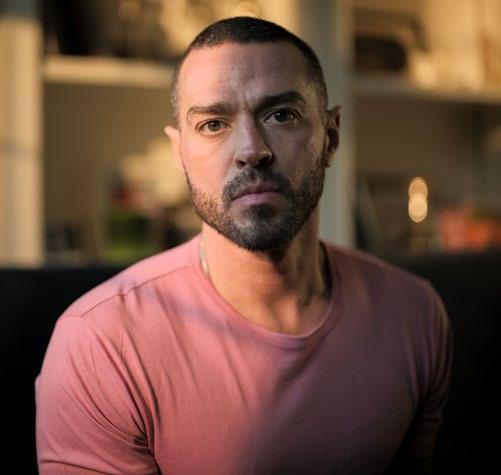
The UPSIDE
Paxo bows out like a don of decorum
Jeremy Paxman made a dignified exit last month when he brought the curtain down on presenting University Challenge after almost 30 years as its master of ceremonies.
You may remember that when Paxo exited Newsnight, his taste for the flamboyant got the better of him. He was even filmed riding a tandem with none other than the then-Mayor of London, Boris Johnson, among other stunts.
On University Challenge, the erstwhile attack dog was the model of decorum. His final words on the programme he had presented since 1994
the director wants and getting that done in the time and within the budget”.
He added: “You need to be able to work fast… when I was a student, we used to have weeks to do what I’m doing in a couple of hours.”
were that, when the show returns later in the year: “I look forward to watching it with you. So, it’s goodnight from me, goodnight!”
No mention of his successor, the ubiquitous Amol Rajan, and uncharacteristic praise for the students: “It’s amazing what they know.”
We shall miss him.
AI’s own Succession won’t be so witty
The Upside will also miss Succession, which finally bowed out amid much backstabbing and virtuoso swearing.
Jesse Armstrong’s saga of the deeply dysfunctional Roys consistently set a very high bar indeed with its scripts.
Could artificial intelligence one day create screenplays of this calibre? Well, not according to Jeremy Strong,
Jeremy Lock, dubbing mixer and Twofour Post Head of Audio, took students through the audio post-production process, with examples from his latest project, BBC One documentary Matt Willis: Fighting Addiction
who played Kendall in the HBO series. “AI ain’t gonna write Succession, or Chinatown or The Godfather. It’s just not going to,” he told Deadline last month.
Dress for yourself, not tired old fogies
Cycling fans were thrilled to see Orla Chennaoui anchoring Eurosport’s coverage of the Giro d’Italia.
Chennaoui’s flair for fashion has attracted negative comment on social media, but as she told the Belfast Telegraph last year: “I dress the way I do on TV for me, for women like me, and for girls who want to keep their personalities into adulthood without having it ssshh’ed out of them by those who think they should fit into socially constructed boxes.”
Artificial intelligence, he revealed, is increasingly used in post-production software, although, speaking after the event, he offered reassurance that TV jobs are not yet under threat. “We’re a long way off the piece of software being able to interpret something they see or hear… and emotionally convey that back to an audience,” he said.
The Twofour colleagues stressed the importance of events such as this masterclass. “Sharney and I have been working together for 25 years… but we both learned something about each other’s jobs today… these events can teach people but they can also bring people together and make connections… that is invaluable.”
Sharney added: “It’s really good that students get to see that the things they are learning can actually be applied to a proper job… and there’s a shortage of colourists.”
Matthew Bell
Chennaoui was inspired to become a journalist by such luminaries as Alex Crawford and Orla Guerin.
Arena pins spotlight on a rock legend
Good to see BBC TV arts flagship Arena still making films of genuine quality.
Nick Broomfield’s featurelength The Stones and Brian Jones, available on iPlayer, was a conspicuously sobering tale of parental neglect and rock ’n’ rivalry.
That the life of such a talented and charismatic young man as Jones – the group’s founder – should end so tragically was deftly handled by Broomfield. And there were some telling interviews, particularly with Bill Wyman, and a rare insight into Jones’s troubled relationship with his father. n
37 Television www.rts.org.uk June 2023
Devon and Cornwall
Matt Willis: Fighting Addiction BBC
RTS Principal Patrons
RTS International Patrons
RTS PATRONS
BBC Channel 4 ITV Sky
A+E Networks International
Apple TV+
Kinetic Content
Liberty Global
NBCUniversal International
Netflix
RTS Major Patrons
Accenture
All3Media
Audio Network
Banijay UK
Boston Consulting Group
Channel 5
Deloitte
Enders Analysis
RTS Patrons
FLB Accountants
Lumina Search
Paramount Spencer Stuart
The Walt Disney Company
Warner Bros Discovery
YouTube
Entertainment One
Fremantle
GB News
IMG Studios
ITN
NTT Data
OC&C
Prime Video
Roku
Mission Bay
MPC Episodic
Patron The former Prince of Wales
Vice-Presidents
David Abraham
Dawn Airey
Sir David Attenborough OM
CH CVO CBE FRS
Baroness Floella
Benjamin OBE
Mike Darcey
Gary Davey
Greg Dyke
Lord Hall of Birkenhead
Lorraine Heggessey
Armando Iannucci OBE
Ian Jones
Baroness Lawrence of
Clarendon OBE
David Lynn
Ken MacQuarrie
Sir Trevor McDonald OBE
Gavin Patterson
Trevor Phillips OBE
Stewart Purvis CBE
Brandon Riegg
Sir Howard Stringer
Chair of RTS Trustees
Jane Turton
Honorary Secretary
Simon Bucks
Honorary Treasurer
Mike Green
BOARD OF TRUSTEES
Lynn Barlow
Julian Bellamy
Simon Bucks
Mike Green
Yasmina Hadded
Kate Phillips
Simon Pitts
Sinéad Rocks
Sarah Rose
Jane Turton
Rob Woodward
EXECUTIVE
Chief Executive
Theresa Wise
S4C Sargent-Disc
STV Group
The Trade Desk
UKTV
Virgin Media O2
YouView
PricewaterhouseCoopers Raidió Teilifís Éireann
CENTRES COUNCIL
Lynn Barlow
Phil Barnes
Fiona Campbell
Agnes Cogan
Stephanie Farmer
Lisa Holdsworth
Kully Khaila
Jennie Marwick-Evans
Will Nicholson
Stephen O’Donnell
Jon Quayle
Cameron Roach
Siobhan Robbie-James
Edward Russell
Rachel Watson
SPECIALIST GROUP CHAIRS
Diversity
Angela Ferreira
National Events
Heather Jones
Education
Graeme Thompson
RTS Futures
Alex Wootten
RTS Digital Innovation
Bursary
Simon Pitts
AWARDS COMMITTEE CHAIRS
Awards Policy
Simon Bucks
Craft & Design Awards
Ade Rawcliffe
Programme Awards
Kenton Allen
Student Television Awards
Sinéad Rocks
Television Journalism Awards
Simon Bucks
Young Technologist Award
Terry Marsh

38
Who’s who at the RTS

















































